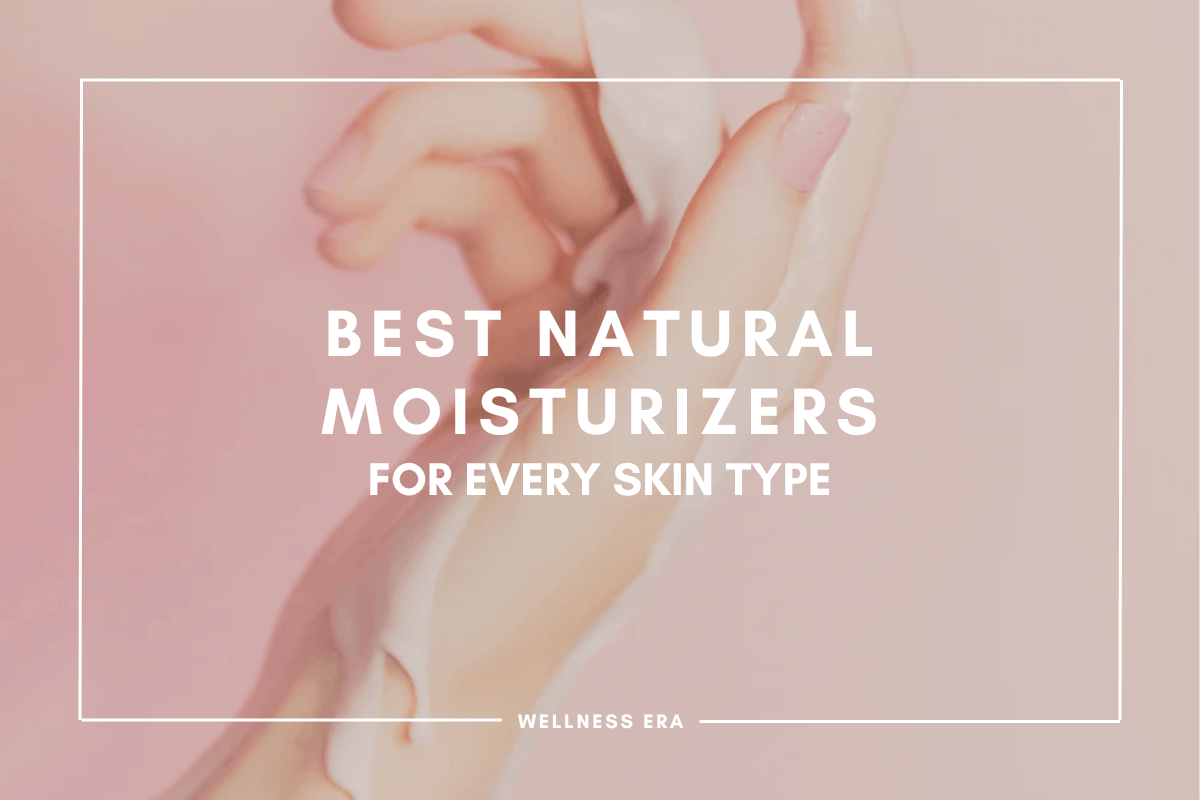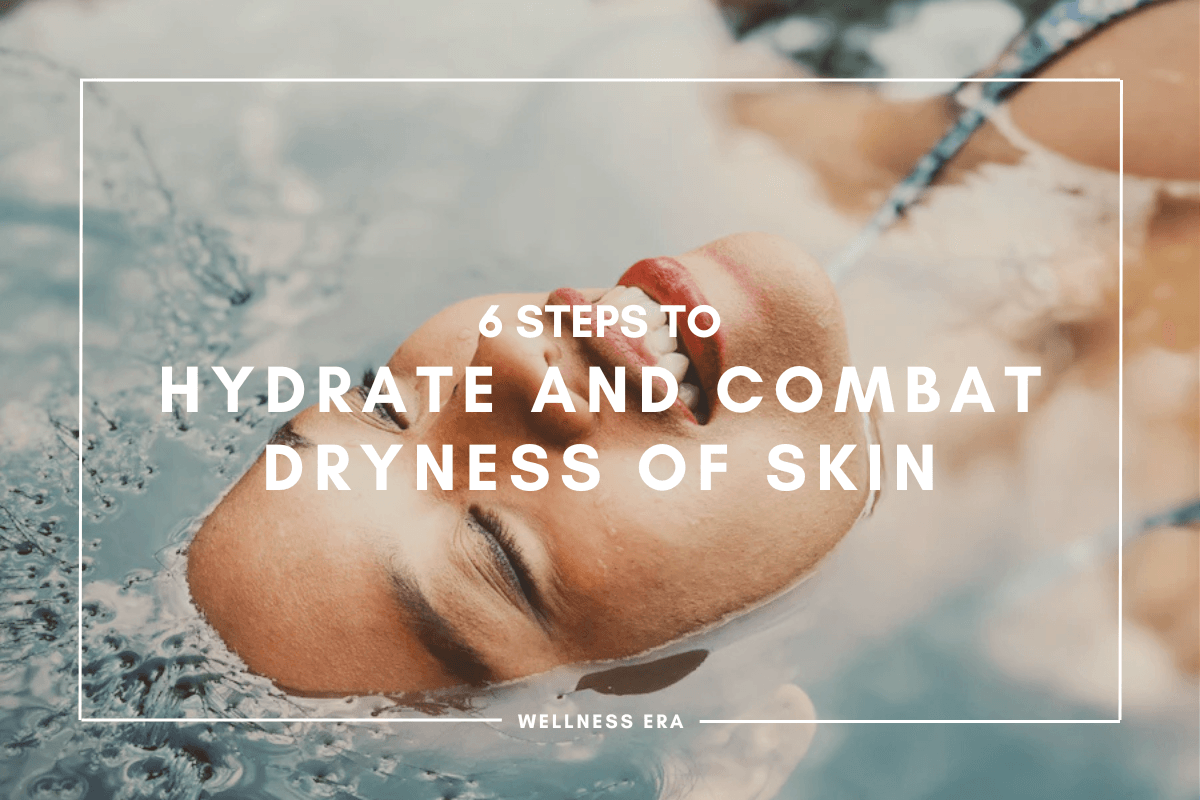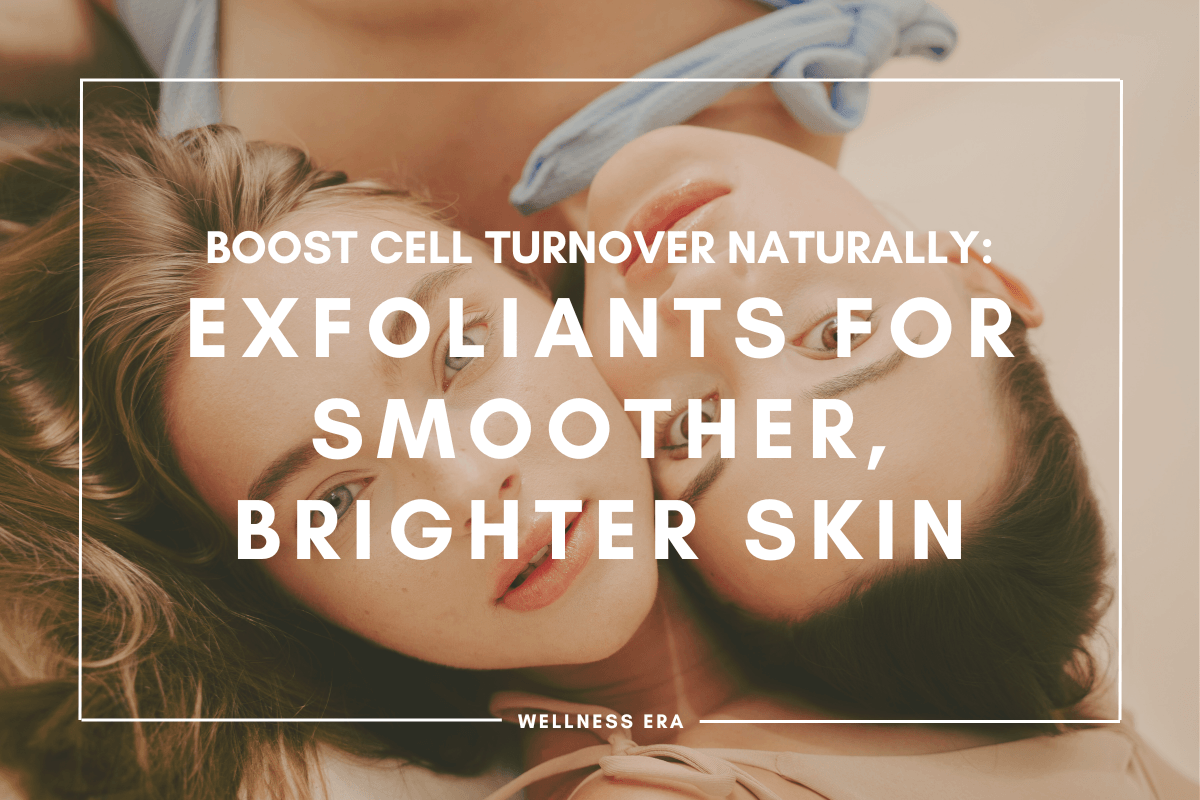How to Moisturize Your Skin Naturally
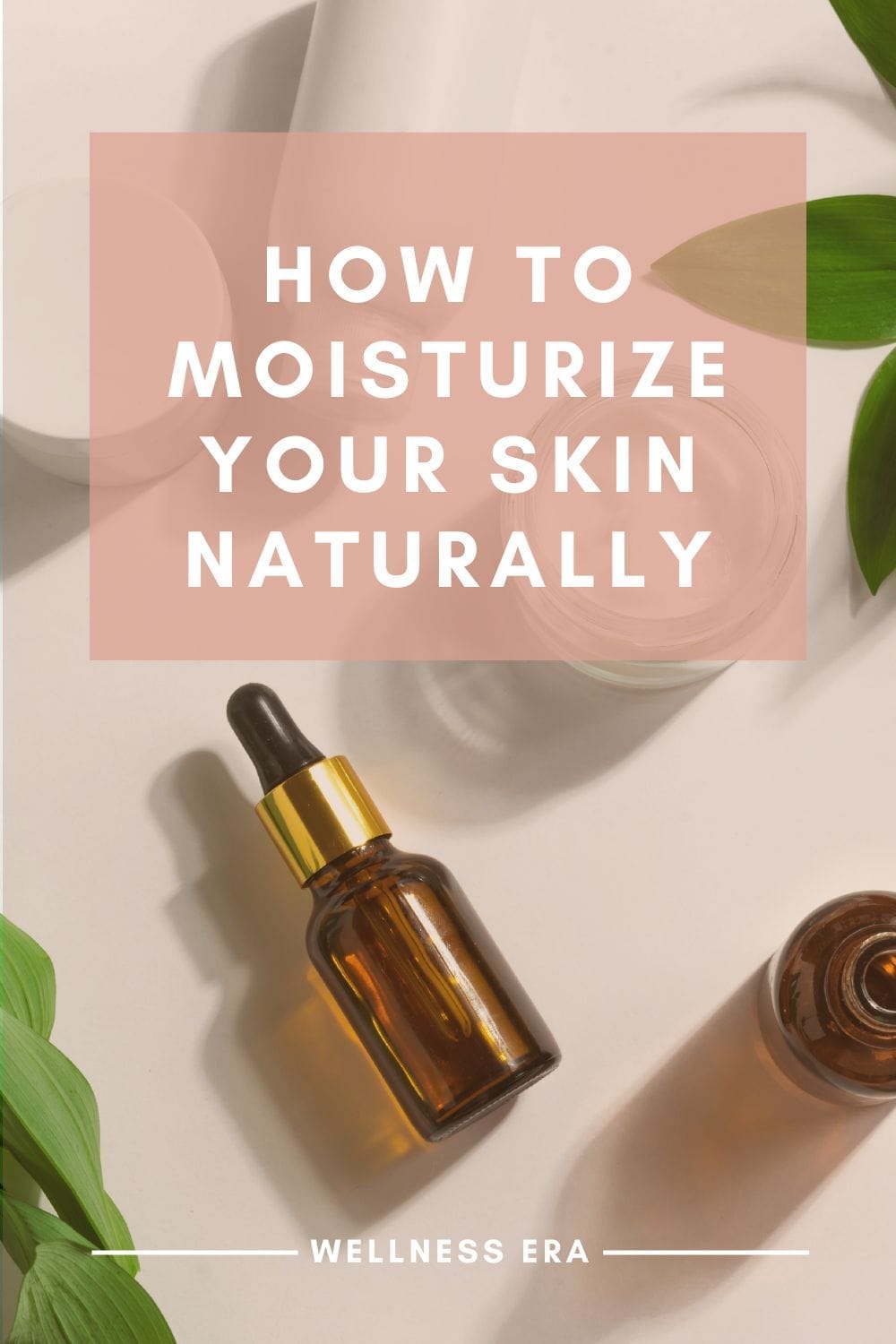
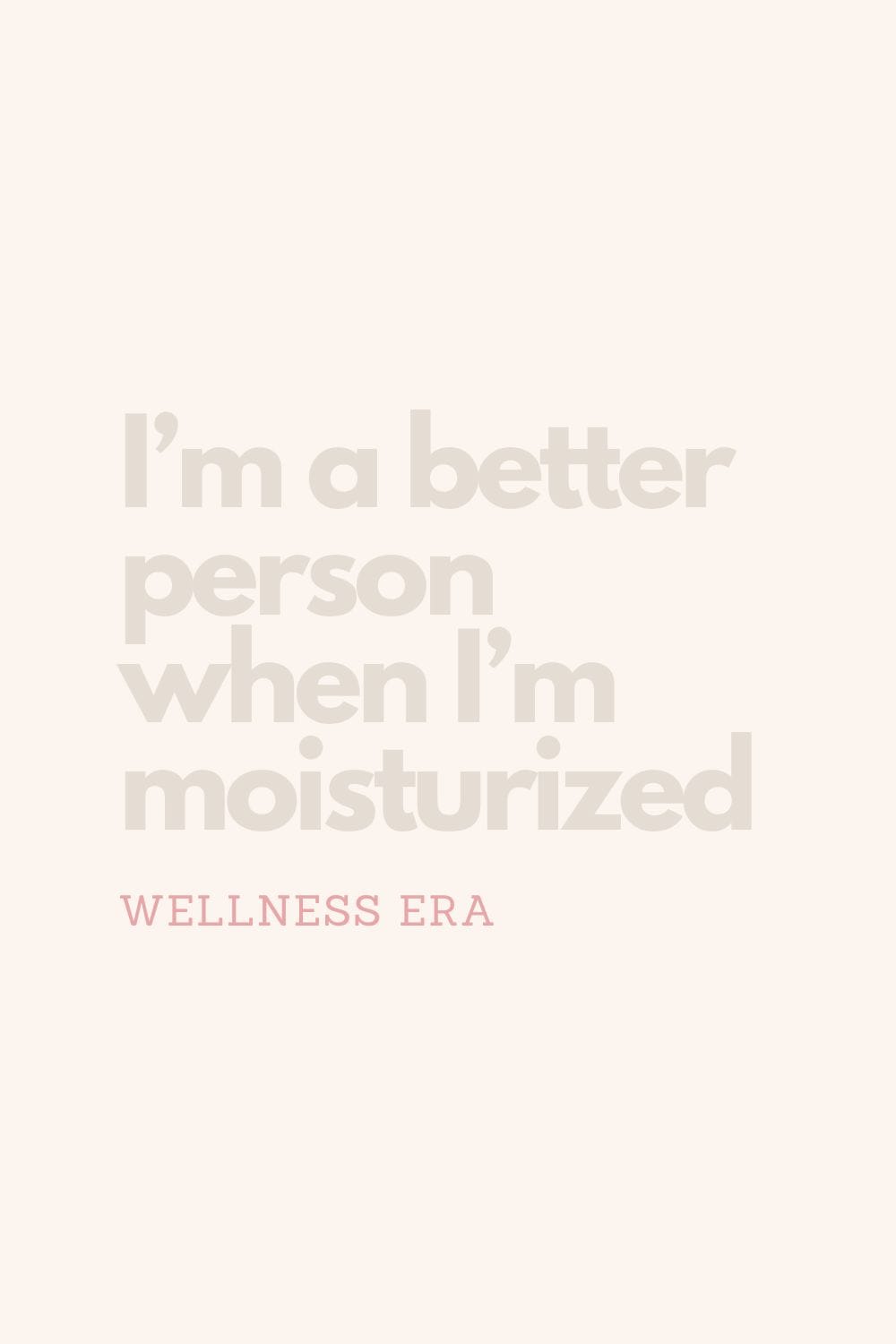
Taking care of your skin doesn't have to involve a shelf full of chemical-laden products. In fact, moisturizing your skin naturally is one of the most effective ways to maintain healthy, radiant skin without exposing yourself to unnecessary toxins. Whether you're struggling with dryness, oiliness, or sensitive skin, natural moisturizing methods can restore balance and help your skin function at its best.
In today’s fast-paced world, it’s easy to overlook the importance of using clean, natural ingredients that align with your body’s needs. Natural skincare allows you to give your skin the nourishment it craves, while steering clear of harmful chemicals and preservatives. In this guide, we’ll explore how you can moisturize your skin naturally, why it’s essential for your skin’s health, and how different skin types can benefit from it.
With a little knowledge, you can hydrate your skin and boost its resilience—without compromise. Let’s dive into the why and how of natural skin care moisturizing.
What Is Natural Skin Care Moisturizing?
Natural skincare moisturizing refers to the practice of hydrating the skin using ingredients derived from natural sources like plants, minerals, and bioactive compounds (Barel et al., 2009). Unlike conventional moisturizers, which may include synthetic chemicals, artificial fragrances, and preservatives such as parabens and sulfates, natural moisturizers focus on minimally processed ingredients (Baran and Maibach, 2017). The goal is to avoid potential irritants while offering eco-friendly solutions for skincare.
Common ingredients in natural moisturizers include botanical extracts, essential oils, and vitamins known for their hydrating properties (Barel et al., 2009). Examples include aloe vera, jojoba oil, shea butter, and hyaluronic acid, which not only hydrate but also provide antioxidant protection (Dini, 2021). However, it's important to note that even natural ingredients can cause irritation depending on concentration and formulation (Barel et al., 2009).
The key benefit of using natural moisturizers is their ability to reinforce the skin's natural barrier, which helps reduce trans-epidermal water loss (TEWL) and shields the skin from pollutants and irritants (Proksch et al., 2008). Natural moisturizers are also closely tied to sustainable and cruelty-free practices, making them a conscientious choice for both skincare and the environment (Baran and Maibach, 2017).
If you’re looking to embrace a cleaner, more sustainable skincare routine, ourComplete Guide to Natural Skin Care for Beginnerscovers everything you need to know about transitioning to toxin-free products and building a healthy regimen.
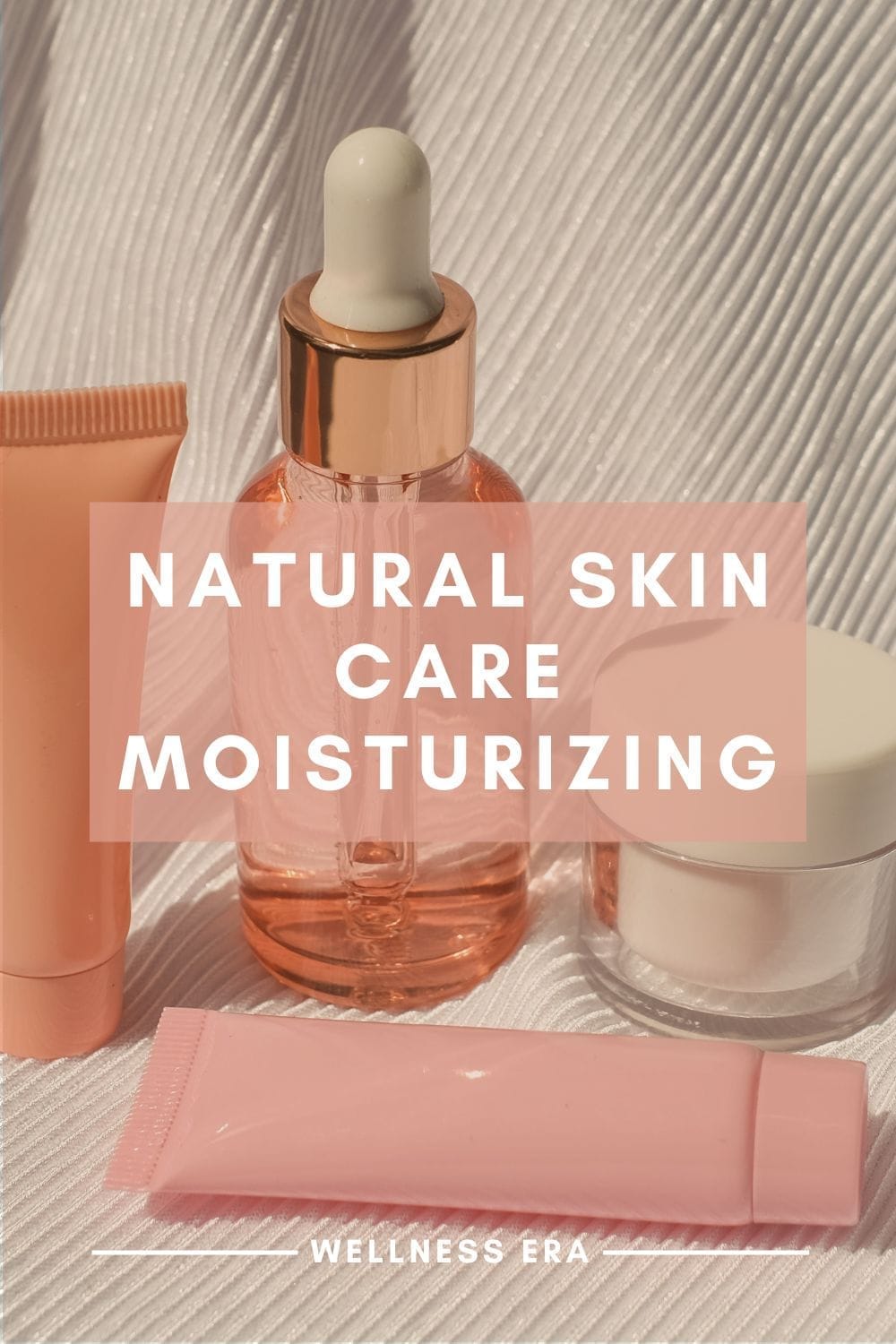
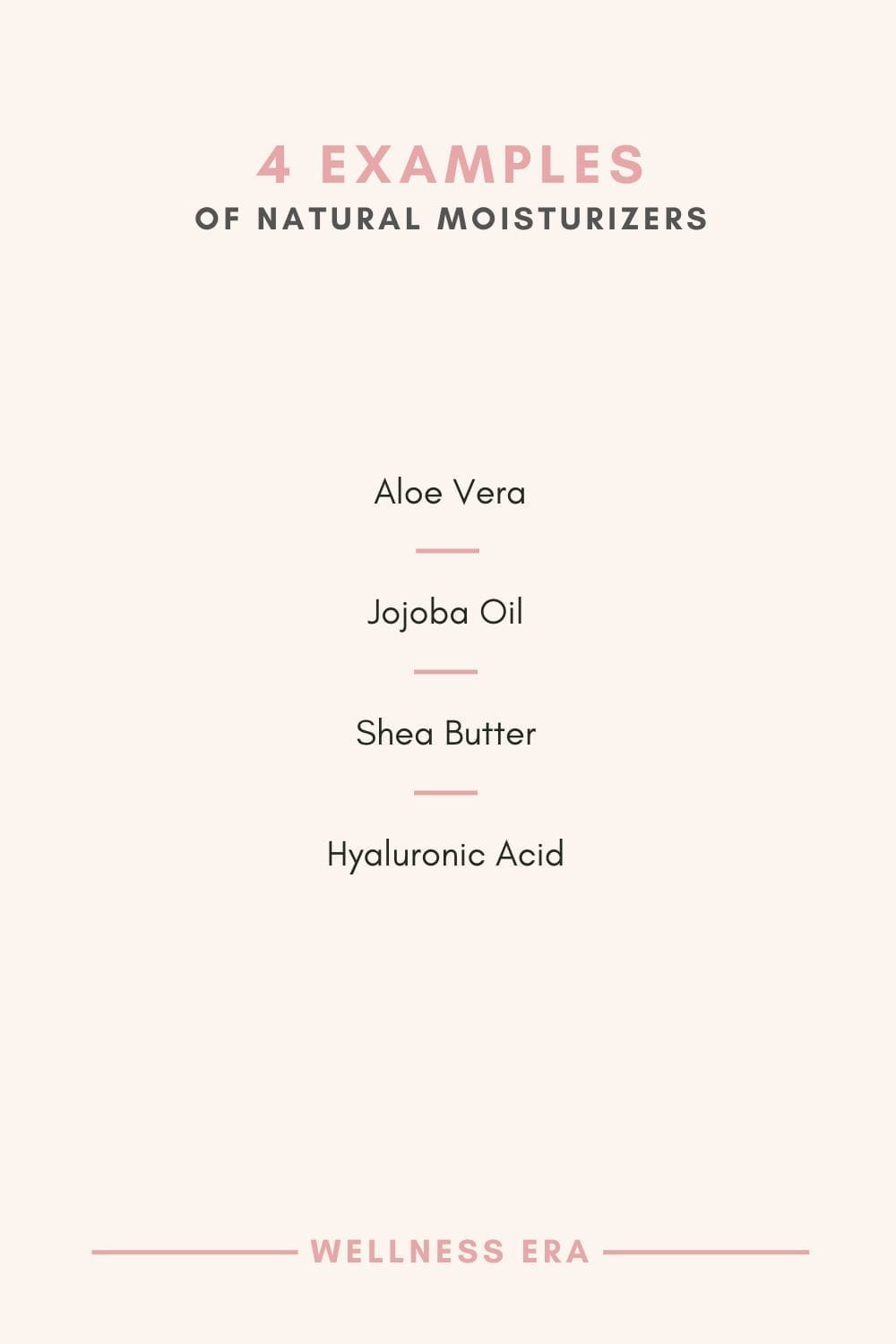
Why Does Your Skin Need Moisturizing?
Maintaining adequate moisture levels in your skin is crucial for overall skin health and appearance. Regardless of your skin type, moisturizing helps to balance hydration, support the skin's barrier function, and protect it from environmental stressors (Proksch et al., 2008).
1. Maintains Skin Hydration: The outermost layer of the skin, the stratum corneum, requires sufficient hydration to remain smooth, flexible, and healthy. Natural moisturizers help trap water in the skin, preventing dryness and flakiness(Barel et al., 2009). Without this moisture, the skin becomes dry and tight, increasing the risk of irritation and discomfort (Proksch et al., 2008).
Keeping your skin properly hydrated is essential for a healthy complexion. Explore6 Steps to Hydrate and Combat Dryness of Skinfor practical tips on preventing moisture loss and keeping your skin supple.
2. Strengthens the Skin Barrier: The skin's lipid barrier plays a vital role in protecting against harmful substances such as pollutants and bacteria. A weakened barrier, often due to lack of moisture, leaves the skin more vulnerable to inflammation and infections (Proksch et al., 2008). Natural moisturizers replenish the lipids, supporting the barrier’s strength and resilience (Barel et al., 2009).
3. Balances Oil Production: Even oily skin requires moisturizing. When the skin becomes dehydrated, it compensates by producing more oil, which can lead to clogged pores and breakouts (Dini, 2021). Using lightweight, non-comedogenic moisturizers helps balance the skin’s oil production and provides hydration without excessive greasiness (Baran and Maibach, 2017).
4. Prevents Signs of Aging: Moisturizers also play a role in slowing the visible signs of aging. As the skin ages, its natural production of collagen and elastin decreases, resulting in fine lines and wrinkles. Natural moisturizers containing ingredients like hyaluronic acid help maintain hydration, keeping the skin plump and reducing the appearance of wrinkles ((Dini, 2021).
As we age, our skin’s collagen and elastin levels naturally decline, leading to visible signs of aging. Learn how to support and protect these vital proteins with natural solutions in our guide on7 Natural Remedies to Boost Collagen Production.
5. Improves Skin Texture and Appearance: Properly moisturized skin looks smoother, more radiant, and healthier. Hydrated skin reflects light better, giving it a natural glow, while dryness can leave the skin looking dull and rough (Barel et al., 2009).
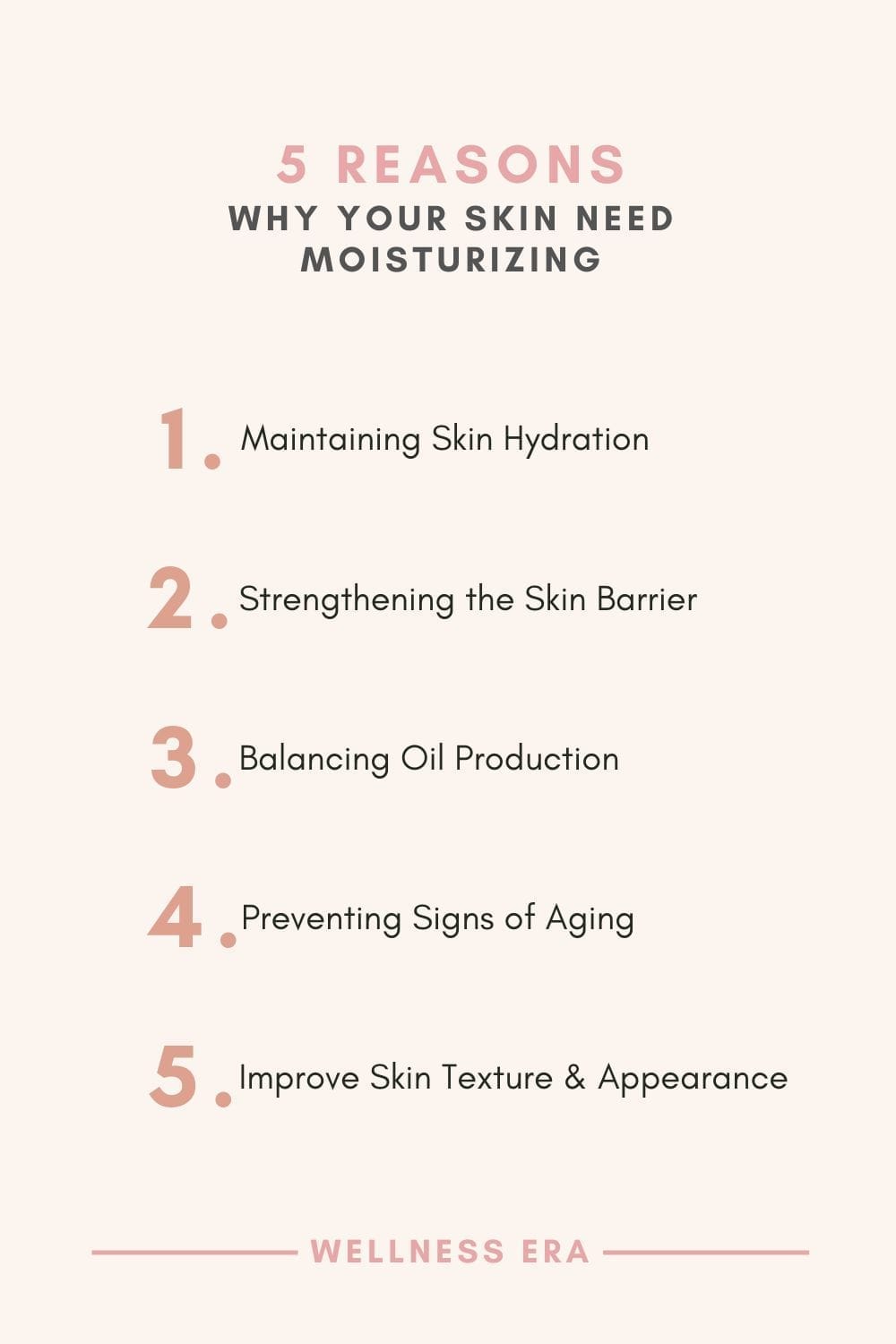
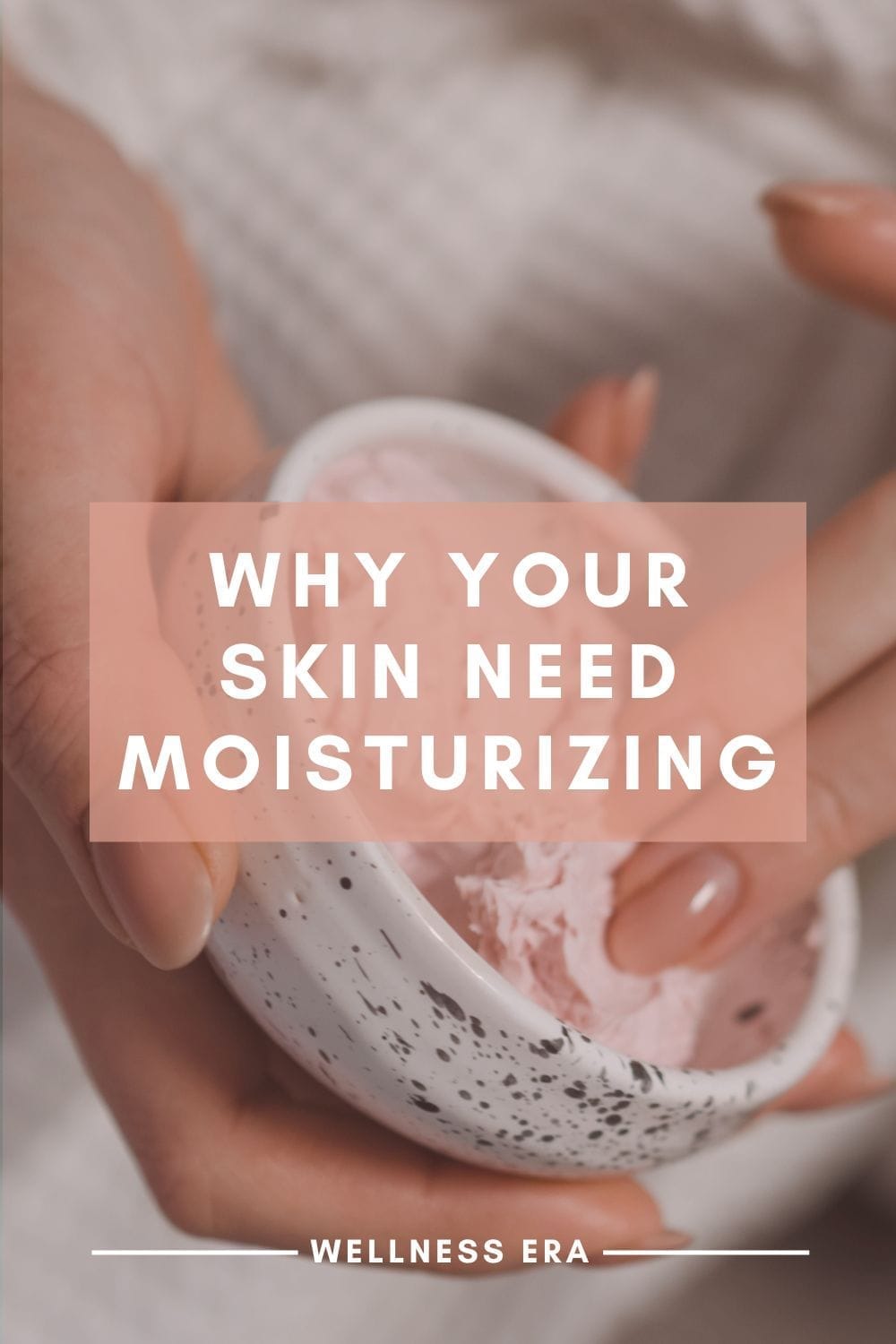
How to Moisturize Different Skin Types Naturally
Each skin type—whether oily, dry, sensitive, or aging—has unique moisture needs. By understanding your skin type, you can adopt a natural moisturizing routine that works best for you, ensuring that your skin stays hydrated and healthy without the need for synthetic ingredients.
Moisturizing Oily Skin
Contrary to popular belief, even oily skin needs moisture. Depriving oily skin of hydration can cause it to produce even more sebum, leading to breakouts and clogged pores. The key is to use lightweight, natural moisturizers that provide hydration without adding excess oil.
Gel-based moisturizers or those labeled as non-comedogenic are ideal for oily skin (Dini, 2021). They hydrate the skin while preventing clogged pores, which can occur with heavier products.
Natural ingredients like aloe vera and tea tree oil are beneficial as they provide light hydration and have anti-inflammatory properties, reducing the risk of acne (Baran and Maibach, 2017).
Managing oily skin requires the right balance of hydration and oil control. Discover the best practices for keeping your skin clear and shine-free in ourStep-by-Step Guide to Managing Oily Skin Naturally.
Moisturizing Dry Skin
Dry skin is more prone to flakiness, tightness, and irritation because it lacks natural oils that help lock in moisture. For dry skin, it’s crucial to use rich, occlusive moisturizers that form a protective barrier on the skin's surface.
Natural ingredients like shea butter, jojoba oil, and glycerin are highly effective for sealing moisture into the skin and preventing trans-epidermal water loss (TEWL) (Proksch et al., 2008).
Humectants such as hyaluronic acid attract water to the skin, keeping it hydrated throughout the day (Barel et al., 2009).
Regular moisturization, particularly in dry or cold climates, is essential for replenishing lost moisture and maintaining skin barrier function. If your skin feels tight, flaky, or rough, it’s time to upgrade your moisturizer. Check out our recommendations for theBest Natural Moisturizers for Dry Skinto deeply nourish and restore hydration.
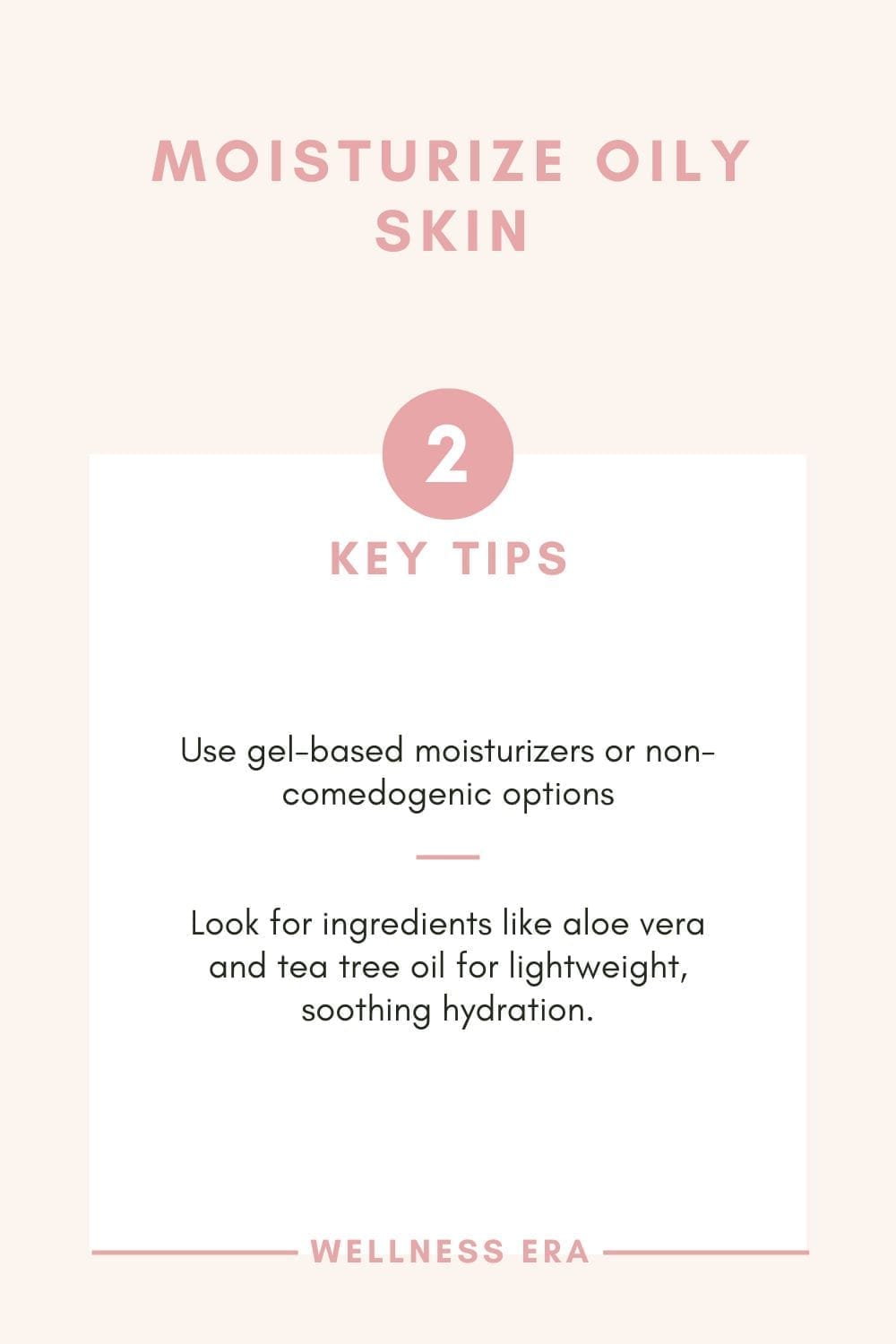
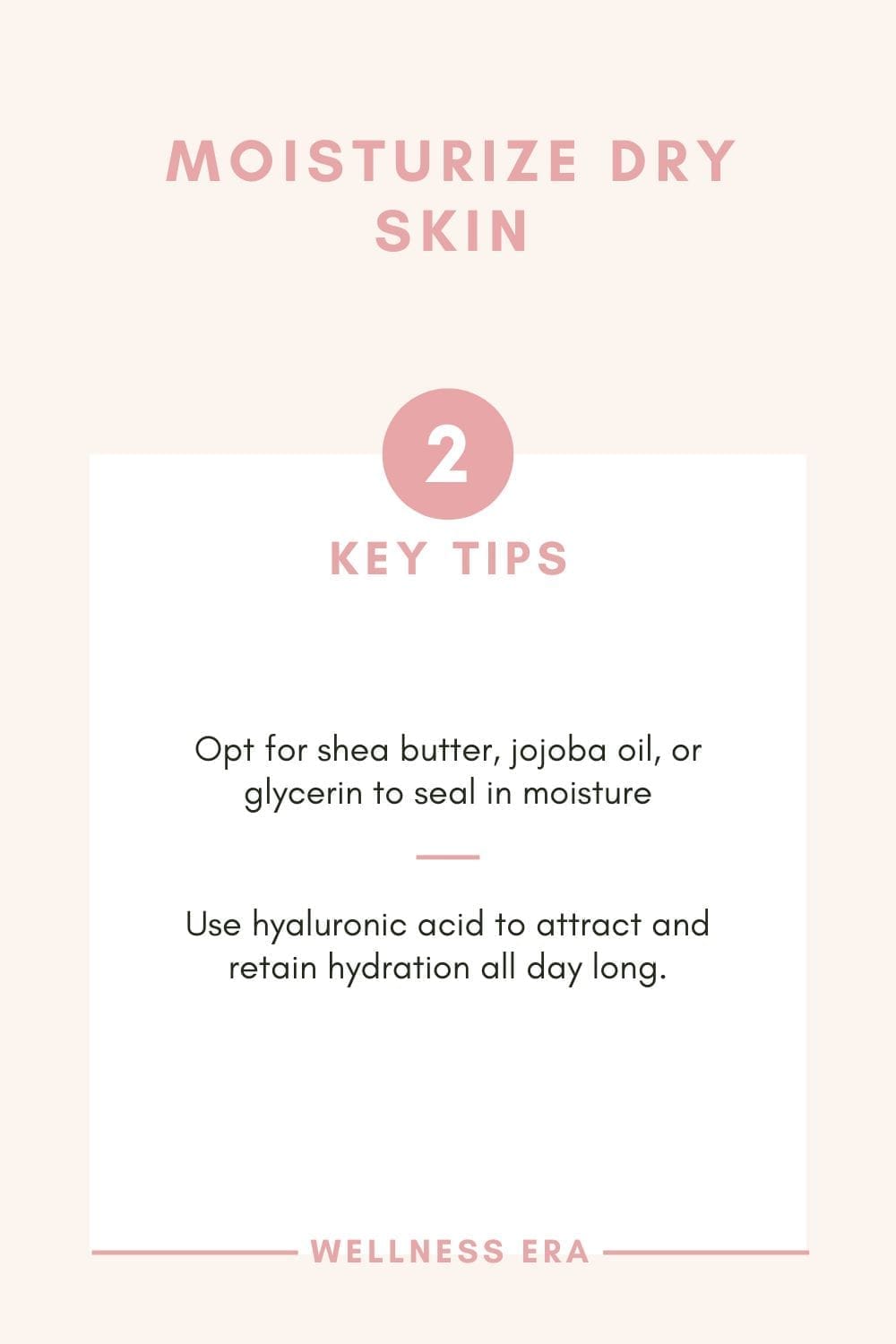
Moisturizing Sensitive Skin
Sensitive skin often reacts to harsh ingredients and environmental factors, making it prone to redness, itching, and inflammation. Choosing gentle, natural moisturizers that are free from fragrances, dyes, and harsh chemicals is essential for maintaining skin balance without causing irritation.
Ingredients such as aloe vera, calendula, and chamomile are known for their calming and soothing effects on sensitive skin (Baran and Maibach, 2017). These natural moisturizers help reduce inflammation while promoting skin repair.
Sensitive skin can also benefit from ceramide-rich moisturizers, which help restore the skin’s natural barrier and retain moisture (Proksch et al., 2008).
Consistent moisturizing helps sensitive skin remain hydrated and protected from environmental stressors without triggering further irritation. Learn how to calm and hydrate your skin effectively in our article onReducing Inflammation Naturally for Smoother Skin.
Moisturizing Aging Skin
As we age, the skin naturally produces less oil, and its ability to retain moisture decreases, leading to wrinkles, fine lines, and dry patches. Aging skin requires deeply hydrating products to support its elasticity and prevent further dehydration.
Moisturizers containing hyaluronic acid and antioxidants like vitamin E and green tea extract help to plump the skin and fight free radicals that accelerate aging (Dini, 2021).
Peptides and collagen-boosting ingredients found in natural anti-aging moisturizers help firm the skin and reduce the appearance of wrinkles (Barel et al., 2009).
Hydration is key to maintaining a youthful appearance, and choosing natural moisturizers ensures that aging skin is nourished and protected without exposure to synthetic chemicals. Want to keep your skin looking youthful and radiant? Explore natural anti-aging techniques and powerful ingredients in our guide onThe Best Natural Remedies for Aging Skin.
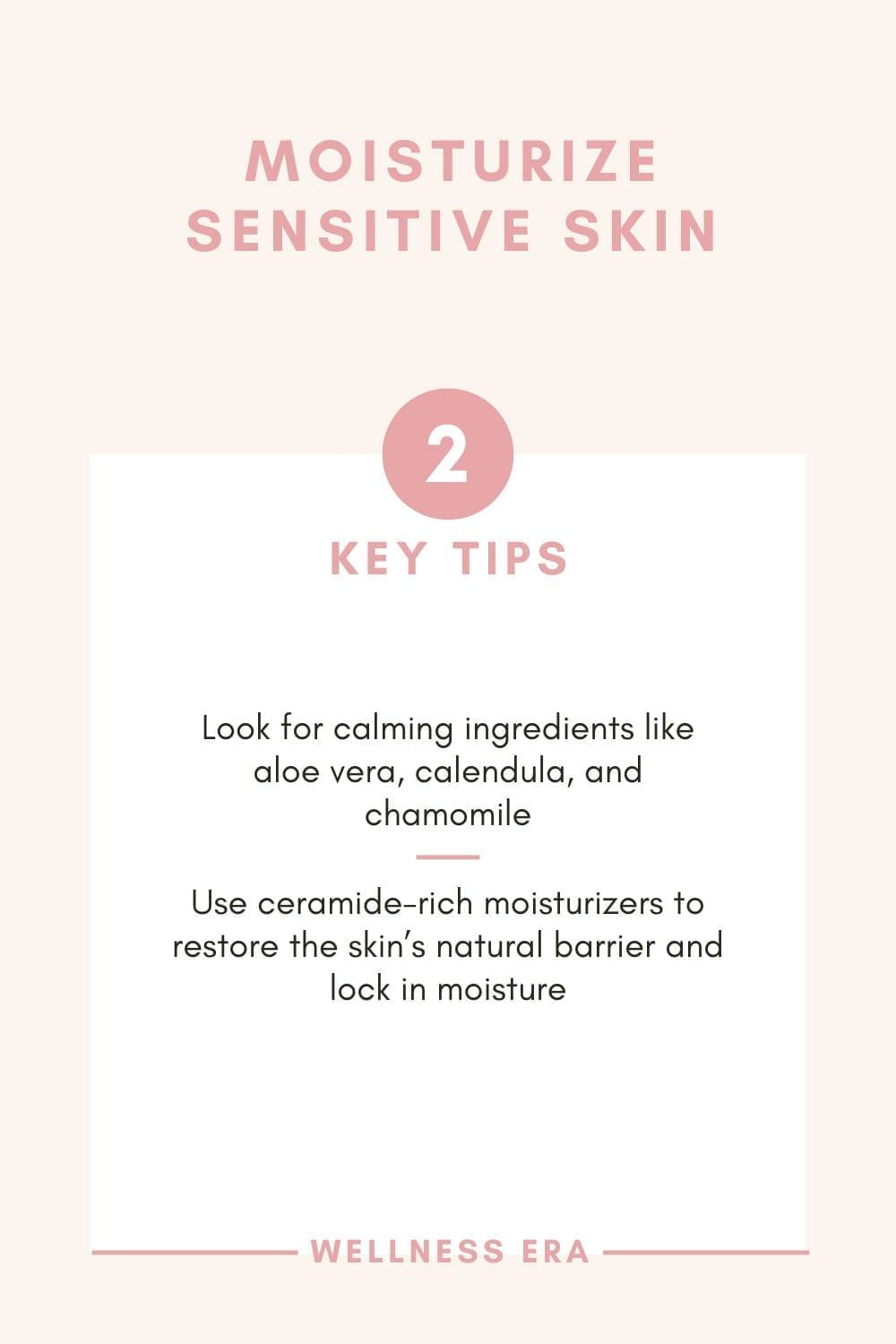
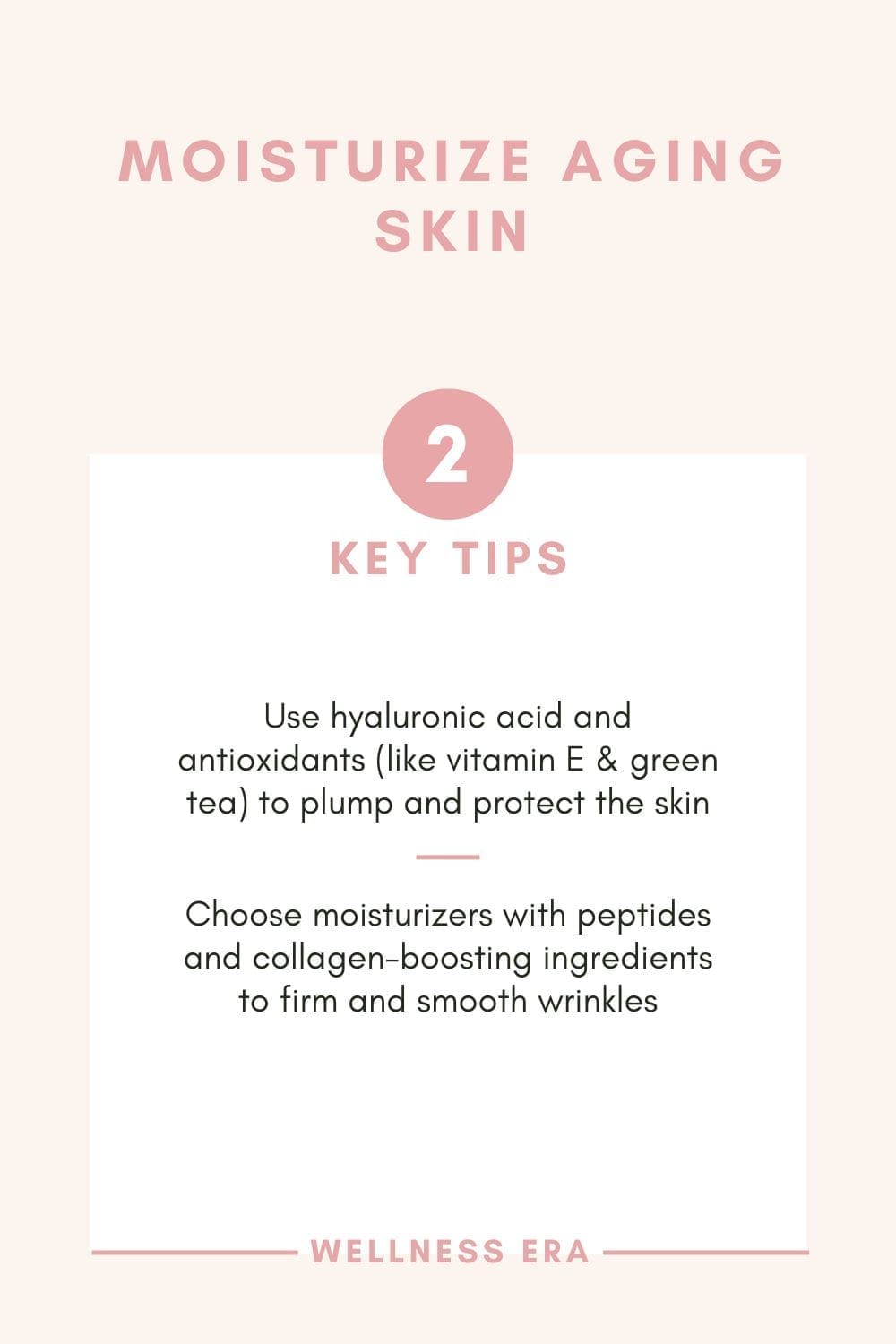
Daily Skincare Routine for Natural Hydration
To keep your skin properly moisturized, it’s important to incorporate moisturizing into your daily skincare routine. A consistent regimen ensures that your skin stays hydrated throughout the day and receives the nutrients it needs to maintain its protective barrier.
Morning Routine
Starting your day with proper skin hydration sets the foundation for healthy skin. Right after cleansing your face with a gentle, natural cleanser, apply a lightweight, hydrating moisturizer that suits your skin type.
Applying a moisturizer while your skin is still slightly damp helps lock in hydration. Additionally, a moisturizer with SPF(made with natural mineral-based sunscreens like zinc oxide) is essential to protect your skin from UV damage, which can dry out and damage the skin (Barel et al., 2009).
Night Routine
In the evening, moisturizing becomes even more critical as your skin repairs itself overnight. After cleansing and toning, use a more nourishing moisturizer to restore hydration and support skin recovery.
Moisturizing before bed ensures that your skin remains hydrated and healthy while it regenerates, preventing the moisture loss that commonly occurs during sleep.
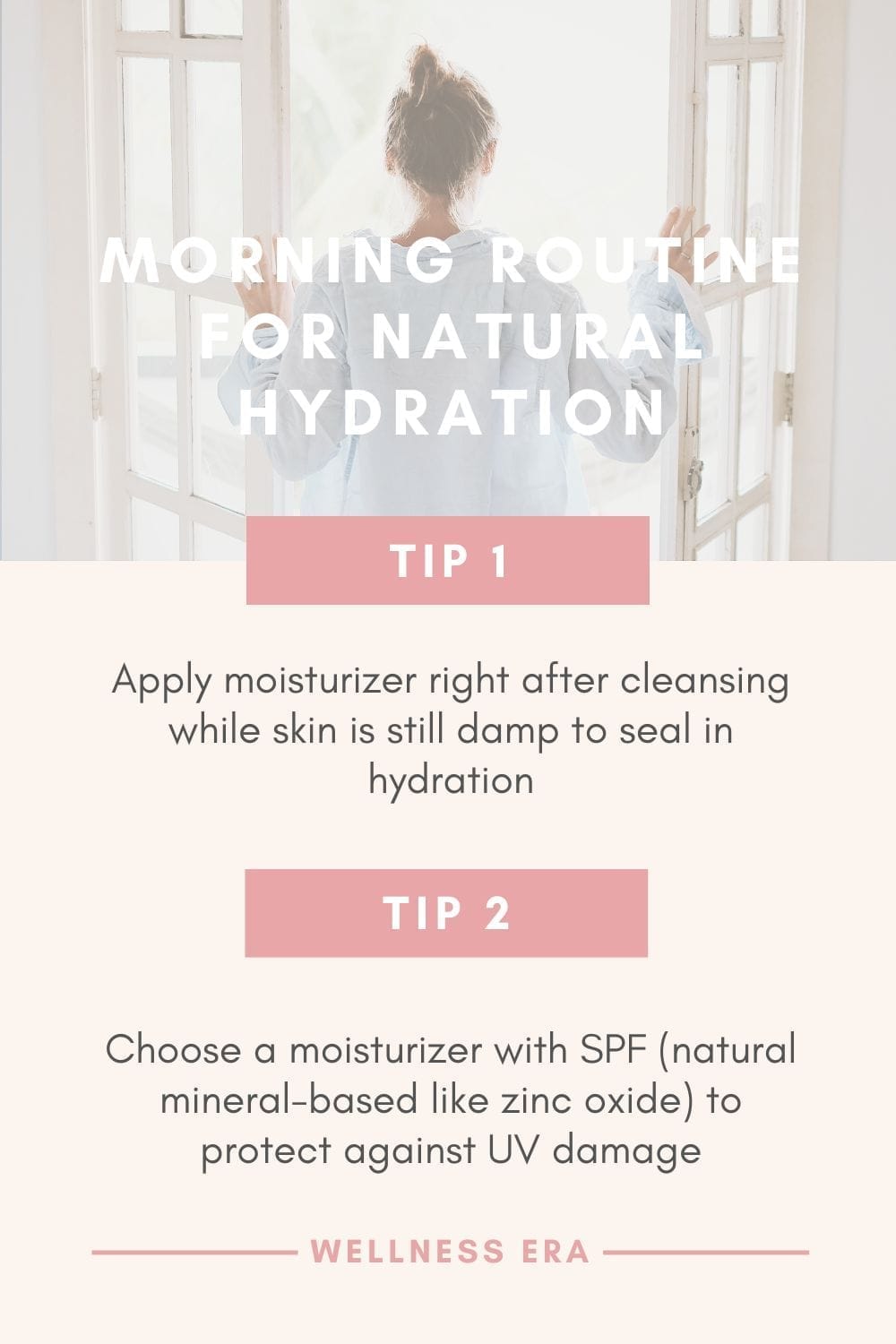
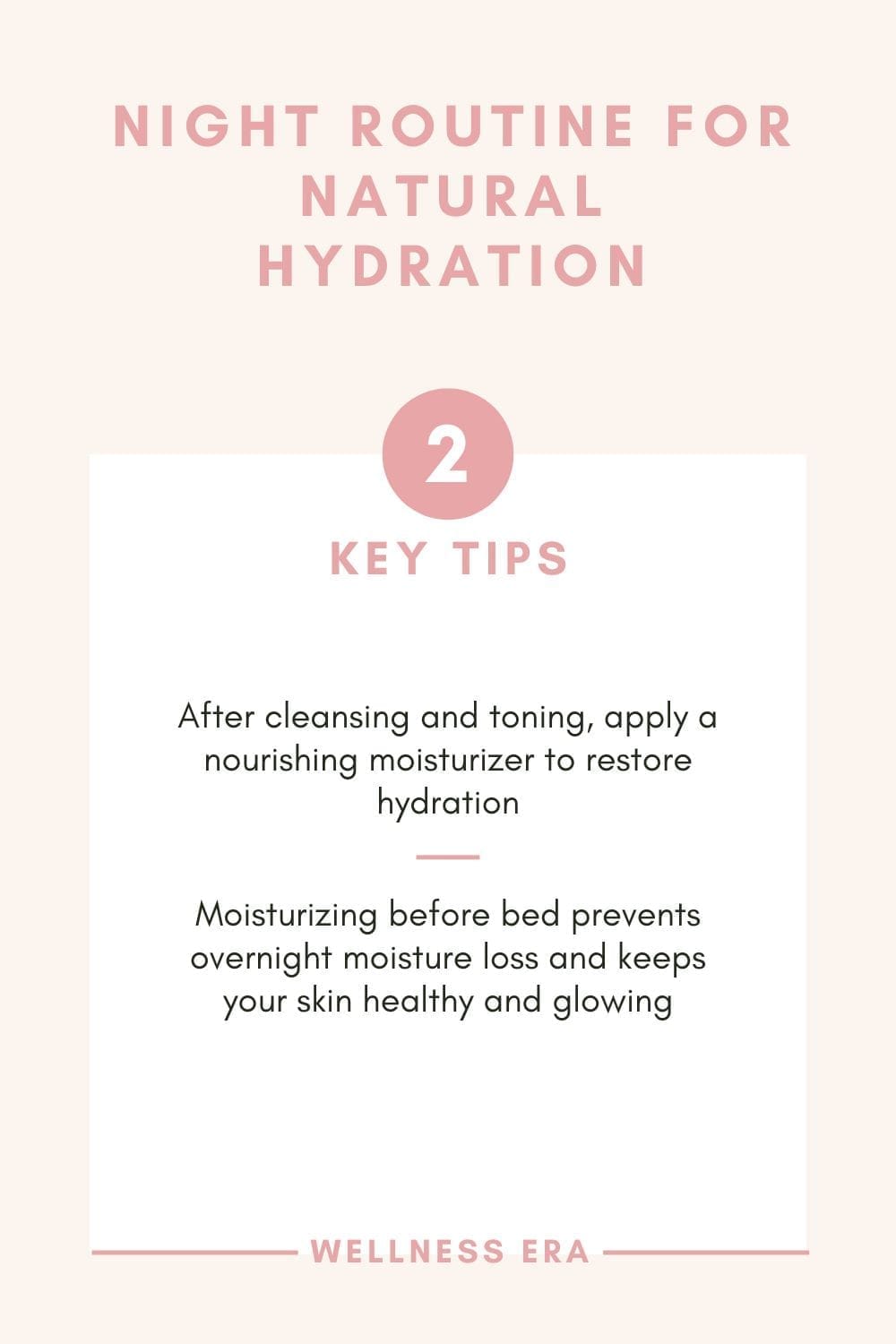
Seasonal Adjustments
Your skincare routine should adjust to the changing seasons to meet your skin’s needs. In winter, when the air is dry, opt for more occlusive moisturizers that provide a protective barrier against harsh conditions. In summer, lighter moisturizers with natural oils or water-based formulas can help prevent your skin from feeling greasy while maintaining hydration (Baran and Maibach, 2017).
Environmental stressors like pollution and free radicals can weaken your skin’s moisture barrier. Discover how antioxidants can protect and nourish your skin in our article onFighting Free Radicals with Antioxidants.
Can You Moisturize Too Often?
While moisturizing is a key part of any skincare routine, it is possible to over-moisturize your skin. Over-moisturizing can disrupt your skin’s natural balance, leading to several potential issues, including clogged pores, excess oil production, and a weakened skin barrier (Dini, 2021). Understanding how much is enough, and when to stop, is critical for maintaining healthy skin.
Clogged Pores and Breakouts
One of the most common consequences of over-moisturizing is the buildup of product on the skin’s surface, especially if you're using a rich or heavy moisturizer that doesn’t suit your skin type (Proksch et al., 2008). Excess product can mix with dead skin cells and oils, clogging your pores and leading to blackheads, whiteheads, and acne.
This is particularly problematic for those with oily or acne-prone skin. Using a non-comedogenic moisturizer that doesn’t clog pores can help prevent this issue (Dini, 2021). Applying moisturizer only when needed and in moderation is essential to avoid this buildup.
Over-moisturizing can sometimes lead to product buildup, making exfoliation an essential step in your skincare routine. Check outBoost Cell Turnover for Brighter Skinto learn how to gently remove dead skin cells and enhance absorption of your moisturizer.
Increased Oil Production
Over-moisturizing can also confuse the skin’s natural oil production mechanisms. For people with oily skin, constantly applying moisture can trick the skin into producing more oil to compensate for the overabundance of hydration (Barel et al., 2009). This can result in a greasy complexion and an increase in breakouts.
To avoid this, oily skin types should opt for lightweight, oil-free moisturizers and apply them only when necessary—usually twice a day is sufficient (Baran and Maibach, 2017).
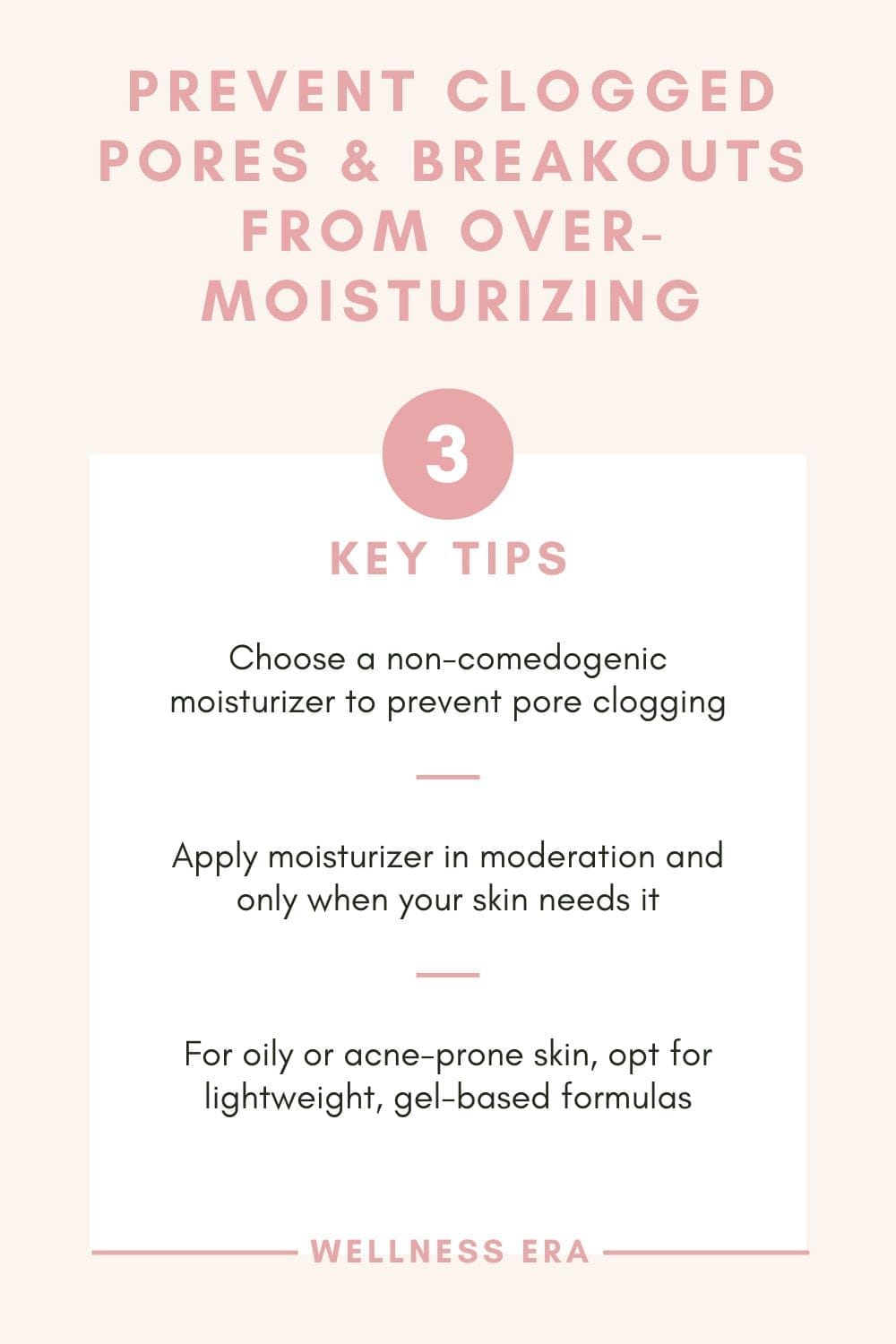
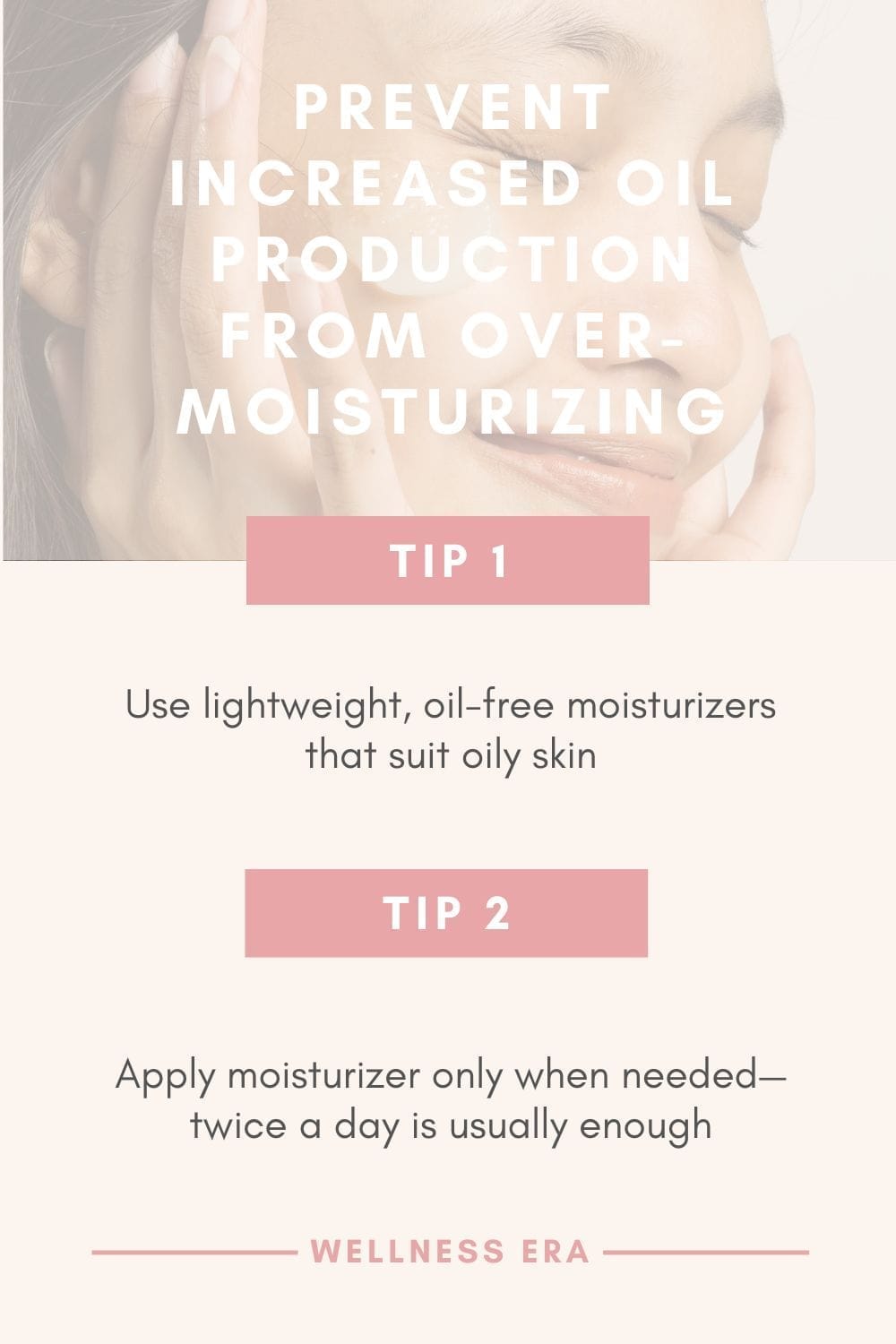
Weakened Skin Barrier
The skin’s barrier is responsible for protecting it from environmental stressors and retaining moisture. Over-moisturizing can impair the skin’s natural barrier function by preventing the skin from regulating its own moisture levels (Proksch et al., 2008). When the skin becomes dependent on external moisturizers, it loses its ability to maintain hydration naturally, making it more vulnerable to sensitivity, irritation, and dryness.
Dull Skin Texture
Overusing moisturizers without allowing for proper exfoliation can result in dead skin buildup, leading to a dull, uneven skin texture (Barel et al., 2009). This occurs when moisture prevents dead skin cells from sloughing off naturally, leaving the skin looking rough or lackluster.
Balancing moisturizing with regular, gentle exfoliation can help maintain a smooth, radiant skin texture.
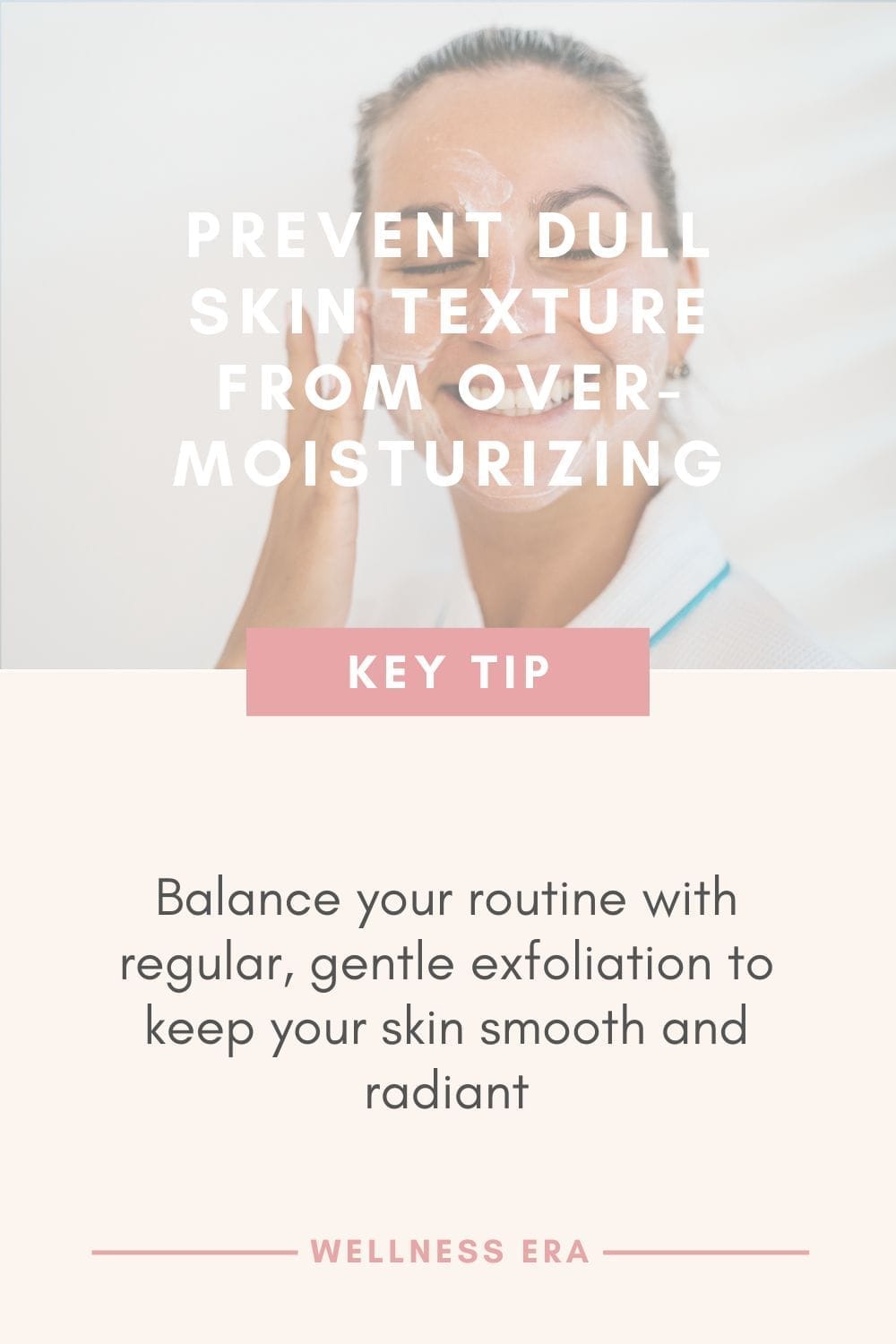
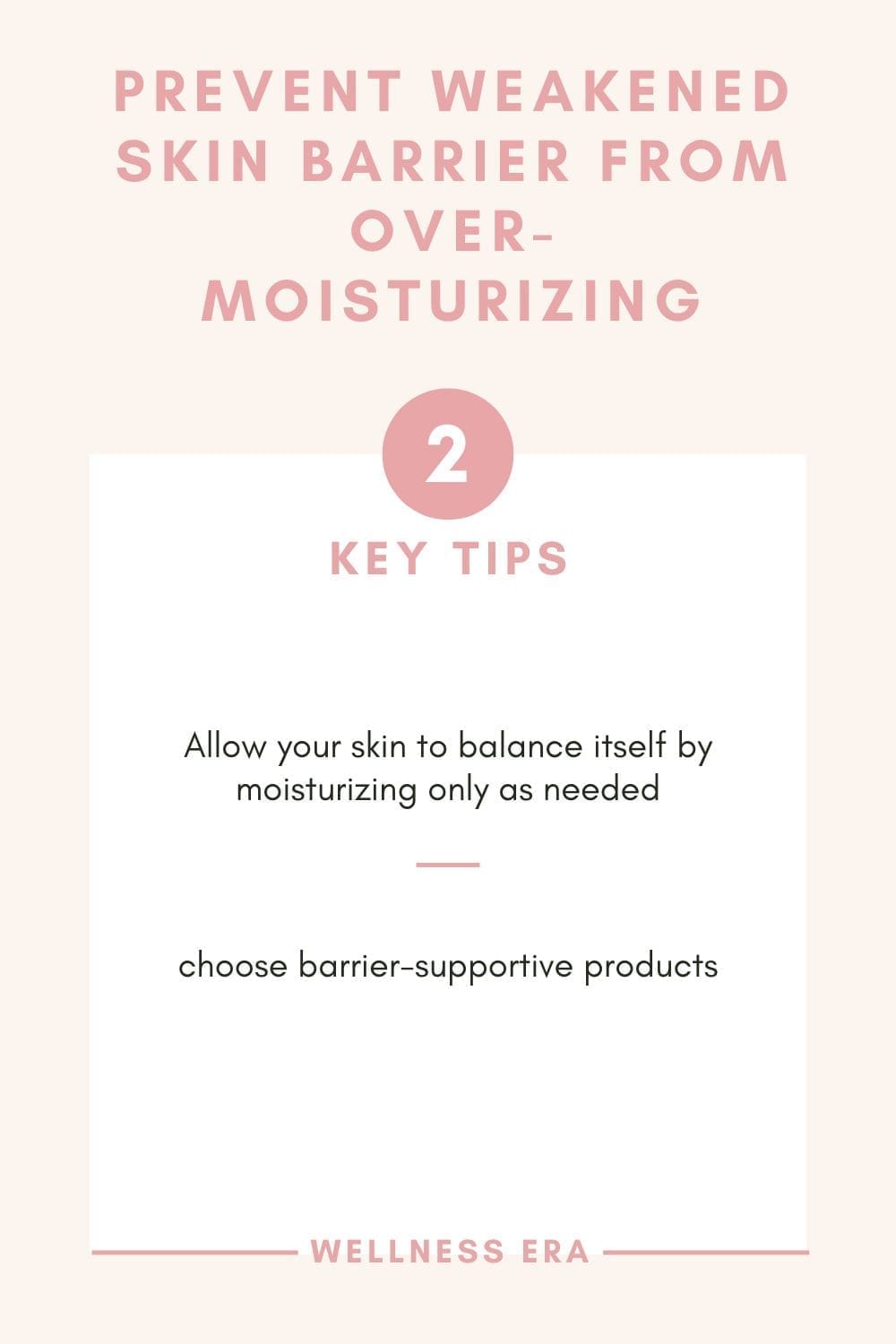
How Often Should You Moisturize?
The frequency of moisturizing depends on your skin type, environment, and overall skincare routine. While moisturizing twice a day—morning and night—is the general recommendation, certain skin types and conditions may require adjustments. Here’s a breakdown of how often to moisturize based on different factors:
Moisturizing Based on Skin Type
Oily Skin: Even oily skin benefits from regular moisturizing. Using a lightweight, non-comedogenic moisturizer once or twice a day helps balance oil production and keeps the skin hydrated without becoming greasy (Zasada et al., 2019). Over-cleansing without proper moisturization can lead to dehydration, causing the skin to produce more oil (Barel et al., 2009).
Dry Skin: Dry skin loses moisture more rapidly, so it requires more frequent moisturizing. Applying a rich moisturizer in the morning and evening helps keep dry skin hydrated throughout the day and night (Proksch et al., 2008). In harsh environments (cold or dry weather), additional applications may be necessary.
Sensitive Skin: Sensitive skin, prone to irritation, benefits from gentle moisturizing once or twice a day with fragrance-free and hypoallergenic products. This routine helps soothe and strengthen the skin's barrier (Baran and Maibach, 2017).
Aging Skin: As skin ages, its natural oil production decreases, requiring regular moisturization. Aging skin can benefit from moisturizing twice a day with products containing anti-aging ingredients like hyaluronic acid or peptides, which help improve skin elasticity and hydration (Dini, 2021).
Environmental Considerations
Cold or Dry Climates: Cold or dry air can deplete moisture from the skin, making it essential to moisturize more frequently. In these conditions, you may need to moisturize two or three times a day to prevent dryness and flakiness (Proksch et al., 2008). Richer, occlusive moisturizers can provide a protective barrier against the elements.
Hot and Humid Climates: In hot and humid environments, the skin naturally retains more moisture, so a lightweight moisturizer applied once or twice a day is typically sufficient (Baran and Maibach, 2017). Gel-based moisturizers are ideal for this climate, as they hydrate without leaving a greasy residue.
Are you spending time in warm climates? Moisturizing alone isn’t enough—protecting your skin from harmful UV rays is just as important. Learn how to shield your skin from environmental stressors in our guide onProtecting Your Skin from UV Radiation and Environmental Damage Naturally.
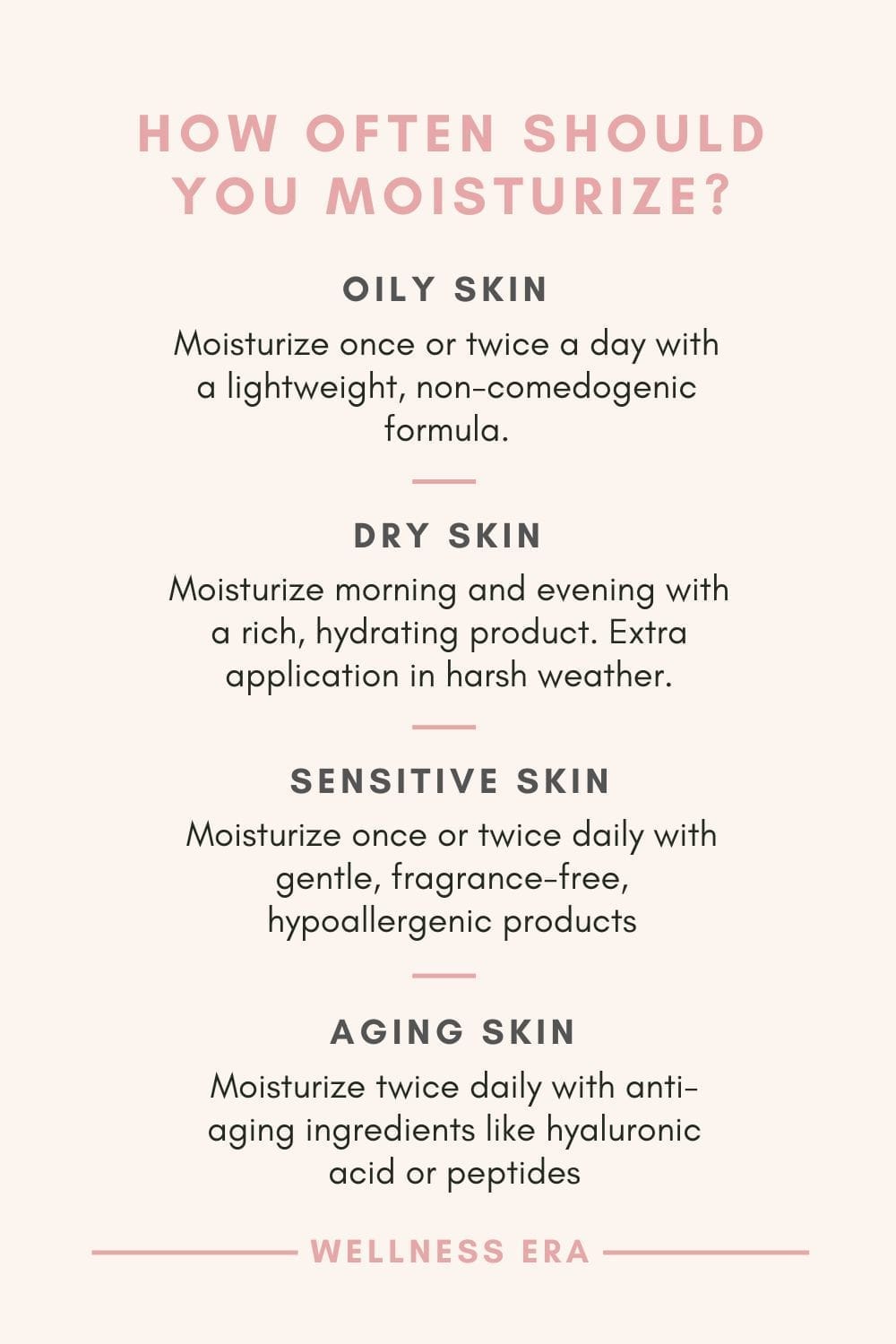
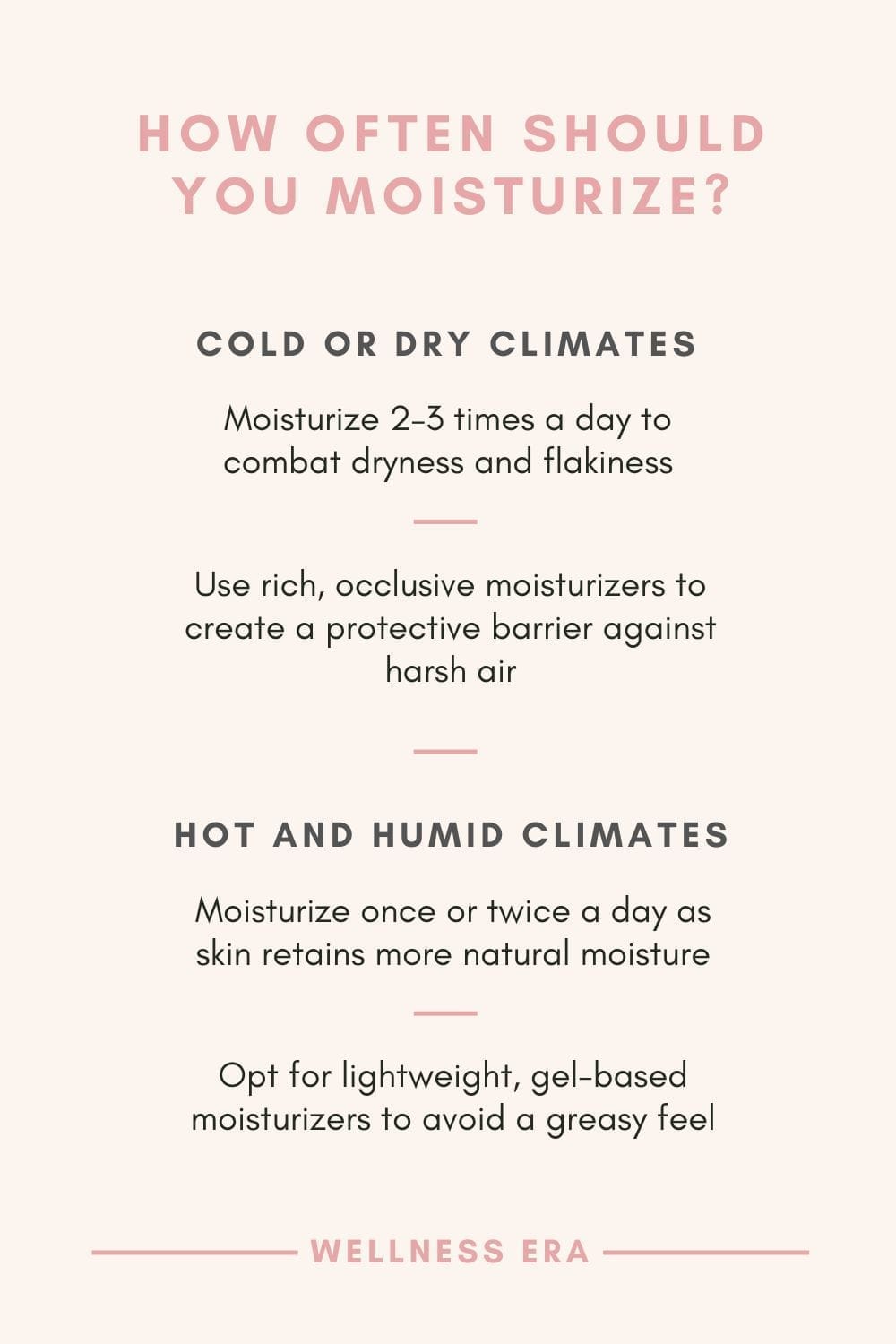
When to Moisturize
After Cleansing: Always moisturize immediately after washing your face. Cleansing can strip the skin of its natural oils, and applying a moisturizer while the skin is still damp helps lock in hydration.
After Exfoliation: After exfoliating, your skin is more prone to dryness as dead skin cells are removed. Following up with a moisturizer ensures that your skin remains hydrated and smooth.
After Sun Exposure: UV rays can dehydrate the skin, making it essential to apply moisturizer after spending time in the sun. Opt for products that contain aloe vera or other soothing, hydrating ingredients.
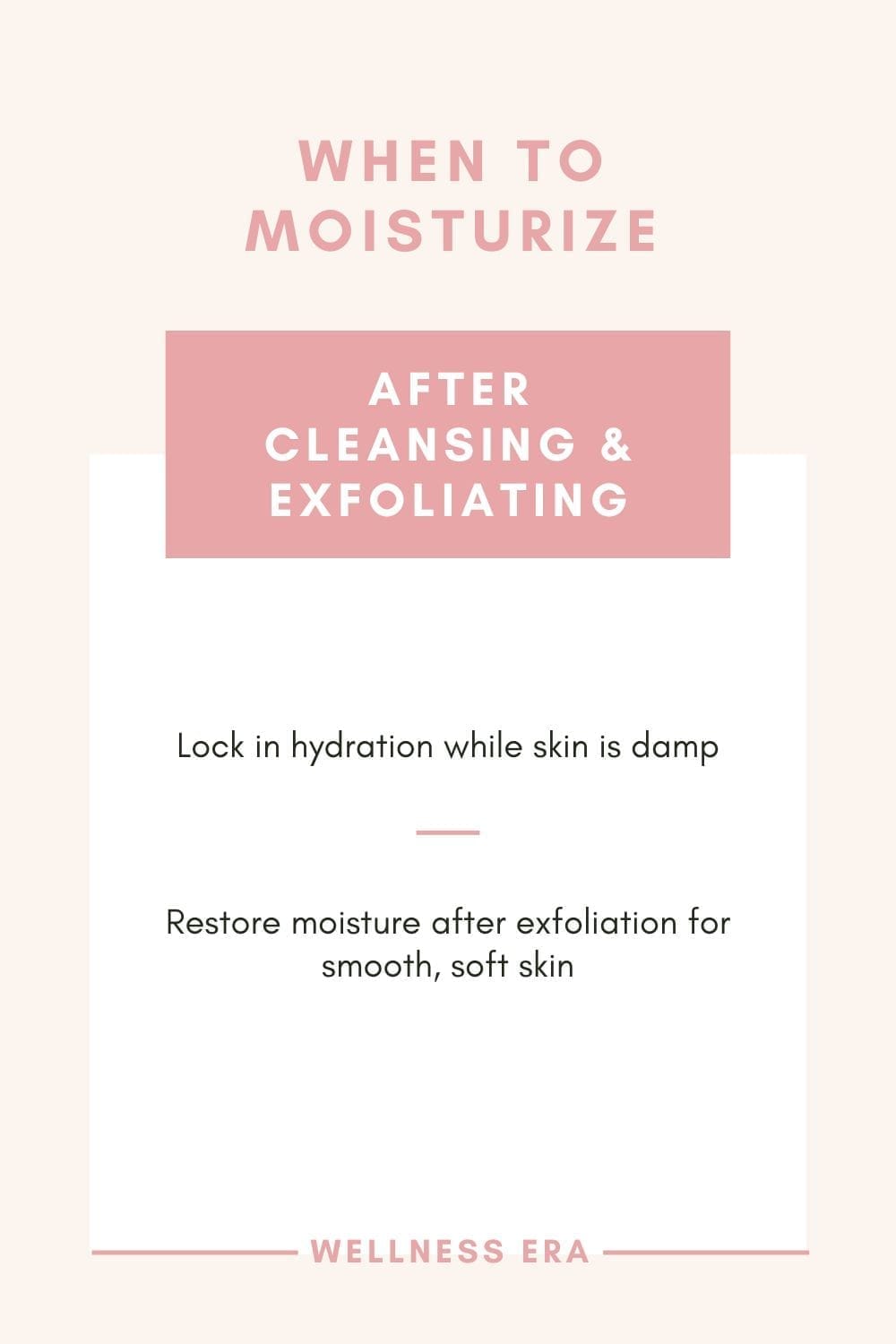
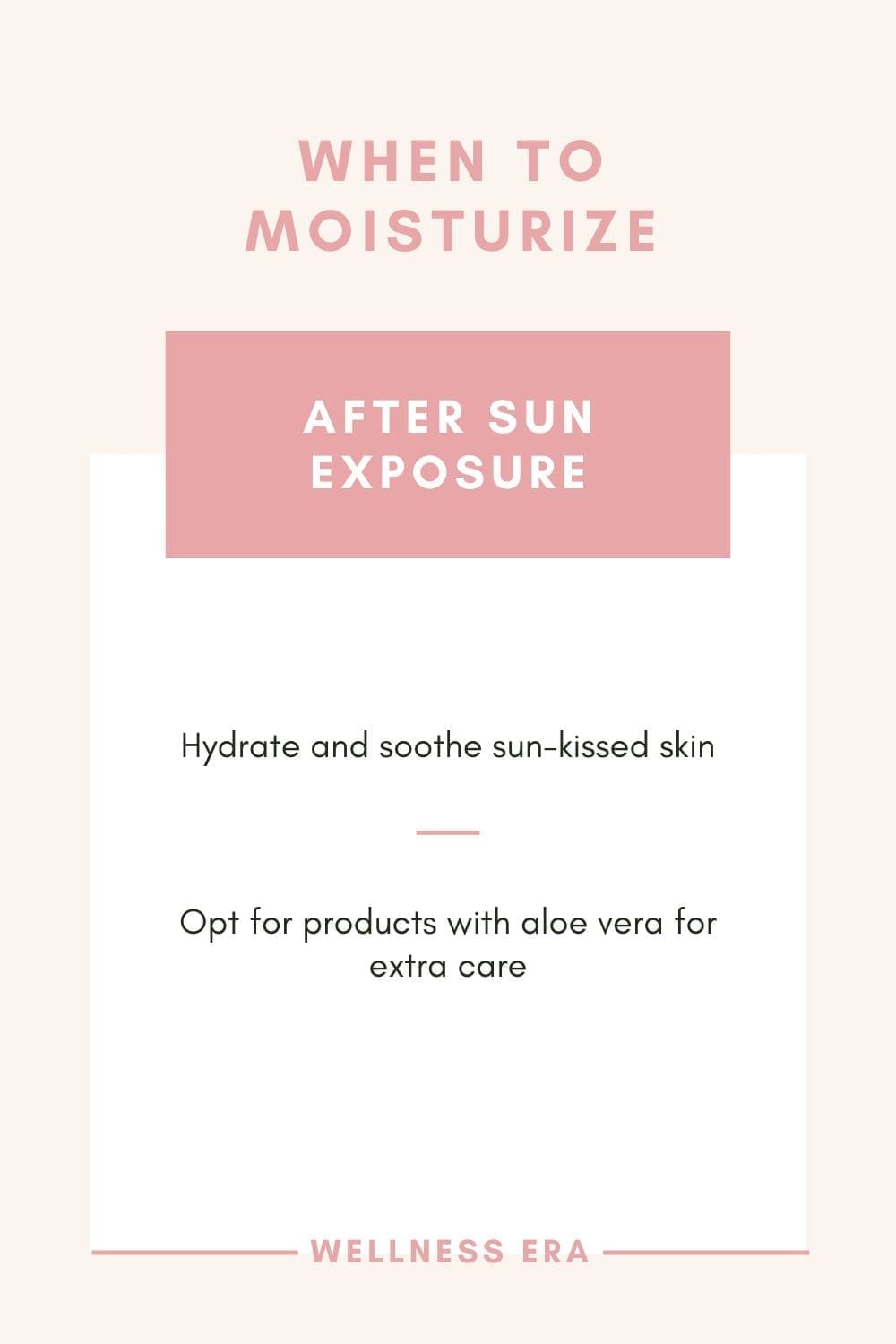
Key Natural Practices for Skin Hydration
While moisturizing plays a central role in keeping the skin hydrated, several other natural practices can further enhance your skin’s moisture levels. Incorporating these into your routine ensures that your skin stays hydrated, healthy, and resilient from both the inside and outside.
1. Hydration from Within
The skin reflects the body’s overall hydration levels, meaning that staying hydrated internally is just as important as external moisturizing. Drinking sufficient water each day helps maintain your skin’s moisture balance and supports its natural barrier function (Proksch et al., 2008). Eating water-rich foods like cucumbers, melons, and citrus fruits can also aid in keeping the skin hydrated from within.
Tip: Aim for 8 glasses of water daily and incorporate hydrating foods into your diet to support overall skin health (Barel et al., 2009).
2. External Moisturization Techniques
While natural moisturizers provide hydration, other external practices can help your skin retain moisture more effectively. For example, applying moisturizers while the skin is slightly damp helps trap water in the skin (Proksch et al., 2008). Additionally, using natural oils such as jojoba oil or argan oil after a bath or shower can provide an extra layer of protection against trans-epidermal water loss (TEWL).
Tip: After cleansing, apply your moisturizer immediately while your skin is still slightly damp to lock in hydration.
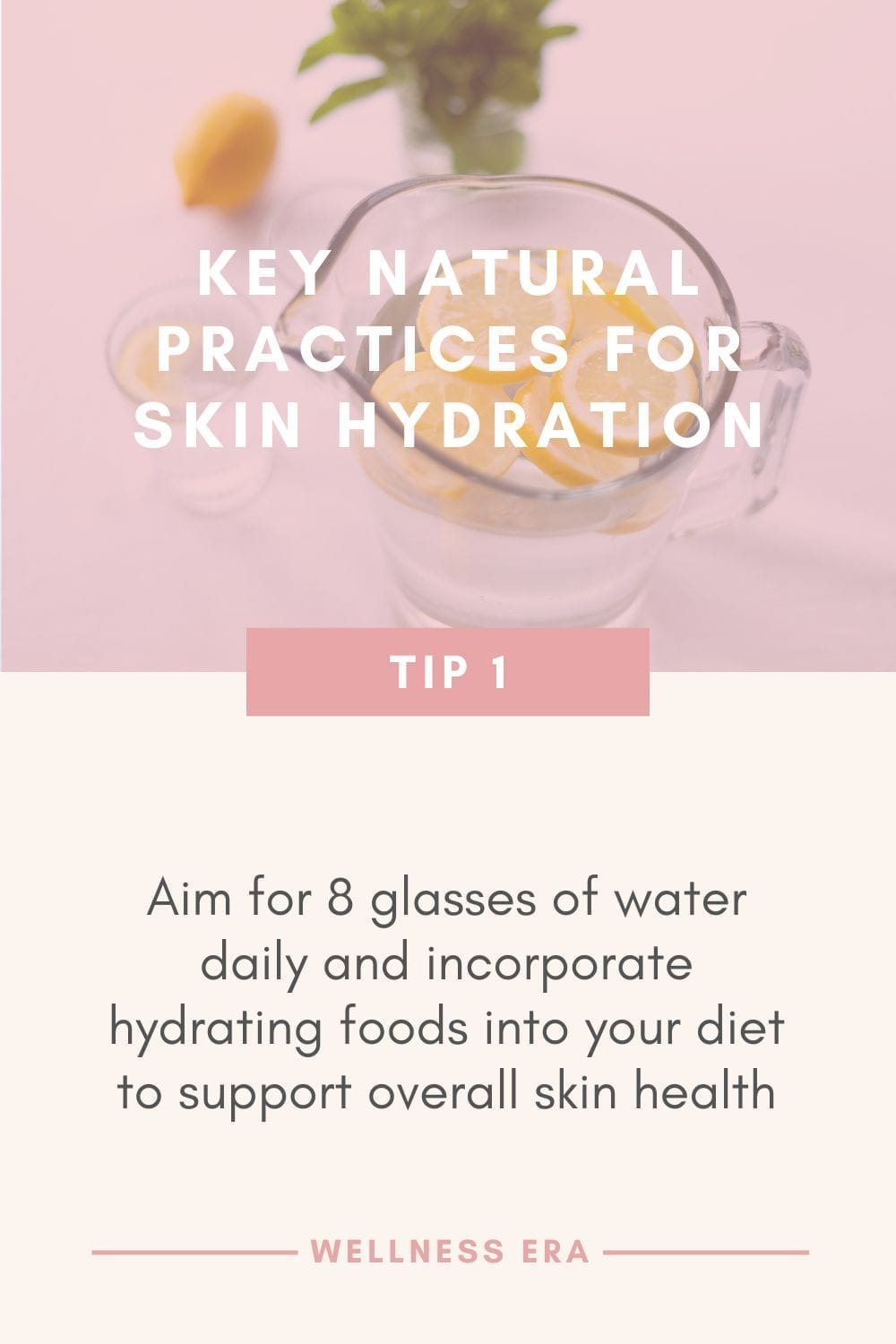
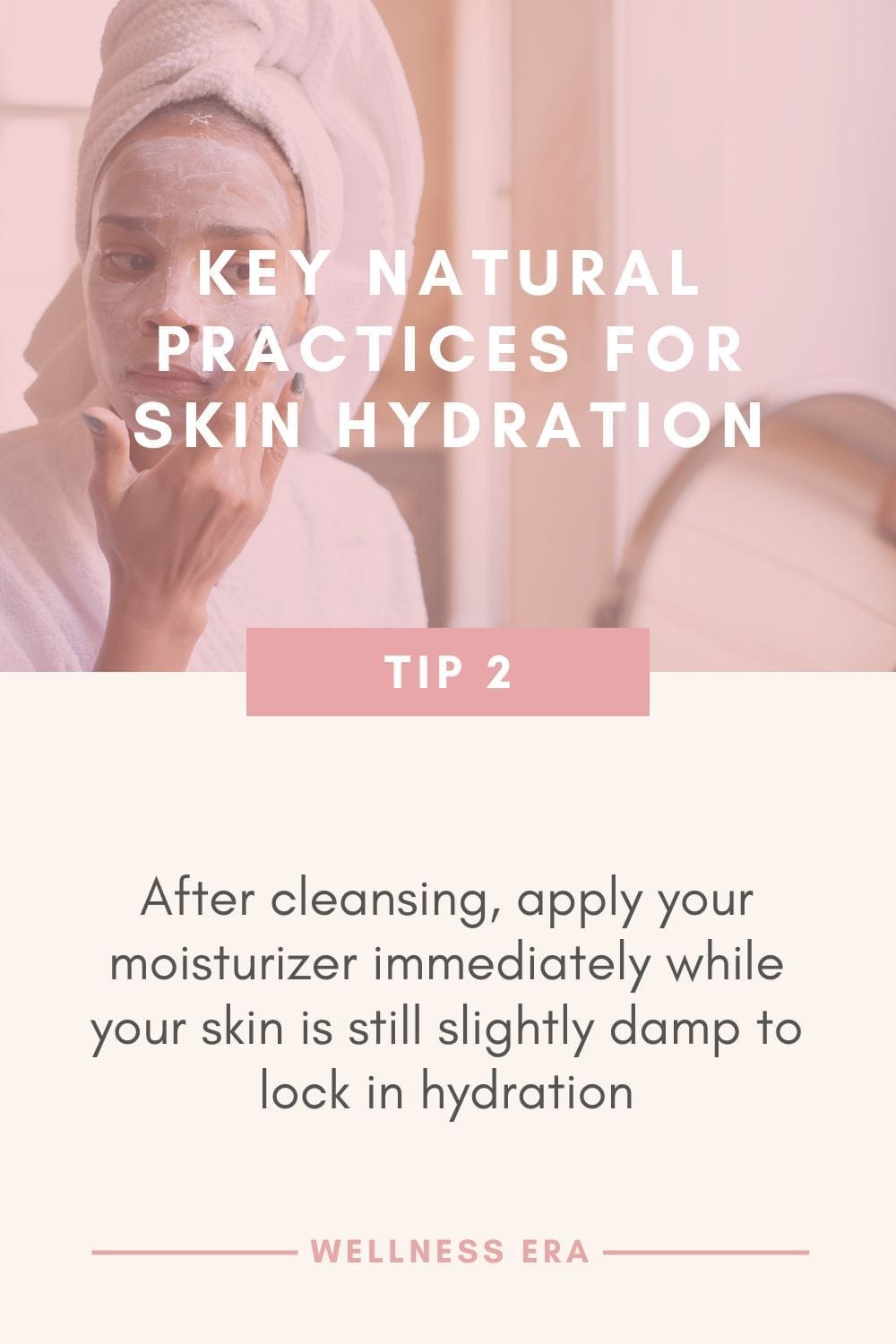
3. Gentle Skincare Practices
Avoiding harsh cleansers or exfoliants that strip the skin of its natural oils is essential for maintaining hydration. Choose gentle, sulfate-free cleansers that won’t disturb your skin’s moisture balance (Barel et al., 2009). Additionally, limit exfoliation to once or twice a week to prevent over-drying.
Tip: Opt for natural, gentle cleansers and exfoliants to maintain your skin’s hydration and integrity.
4. Mindfulness and Skin Care
Your skincare routine can also benefit from mindful practices. Massage your skin gently when applying moisturizer to stimulate circulation and aid absorption. Taking the time to care for your skin in a mindful, intentional way can also reduce stress, which can have positive effects on your skin’s health (Baran and Maibach, 2017).
Tip: Integrate gentle facial massage into your moisturizing routine to improve absorption and reduce stress.
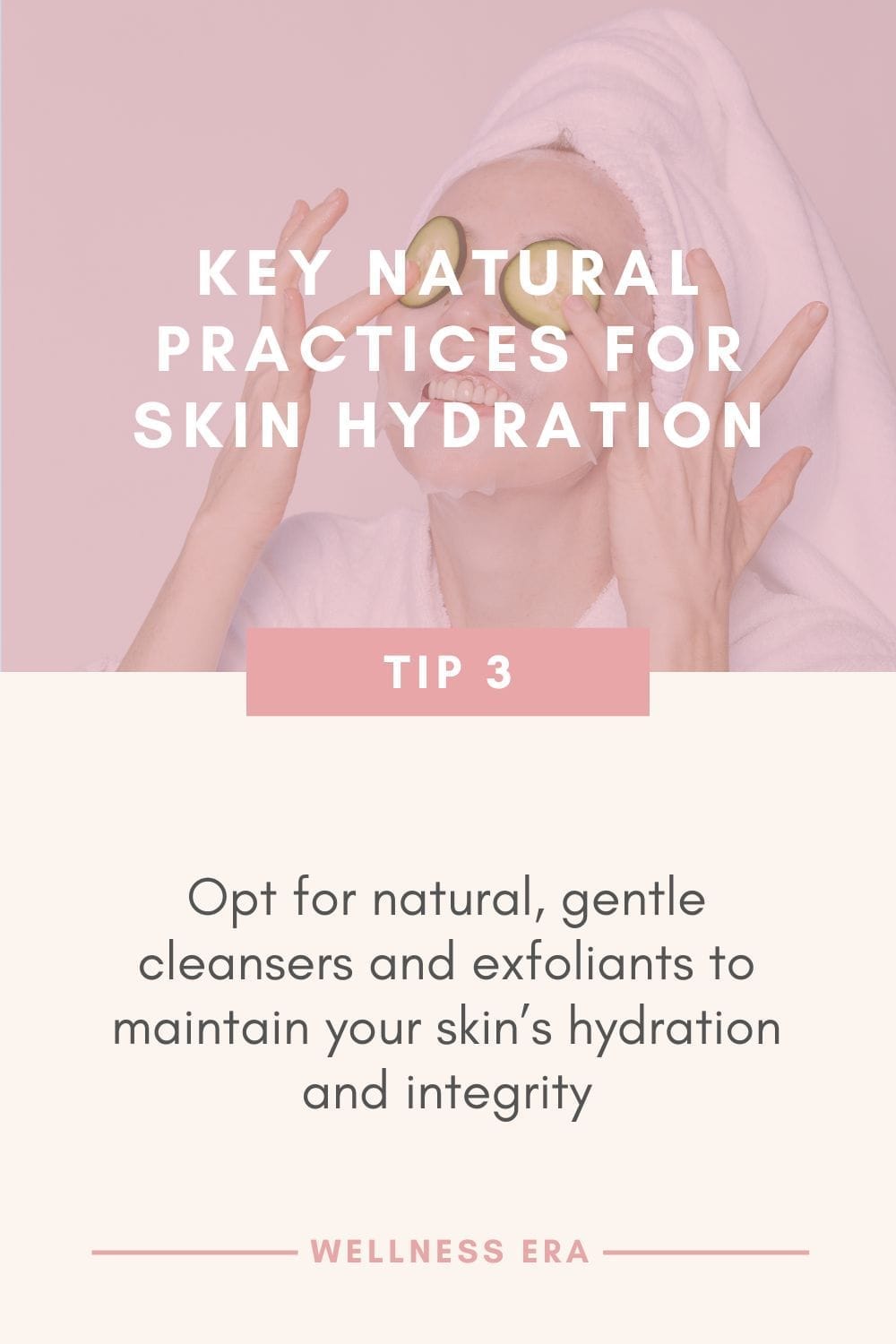
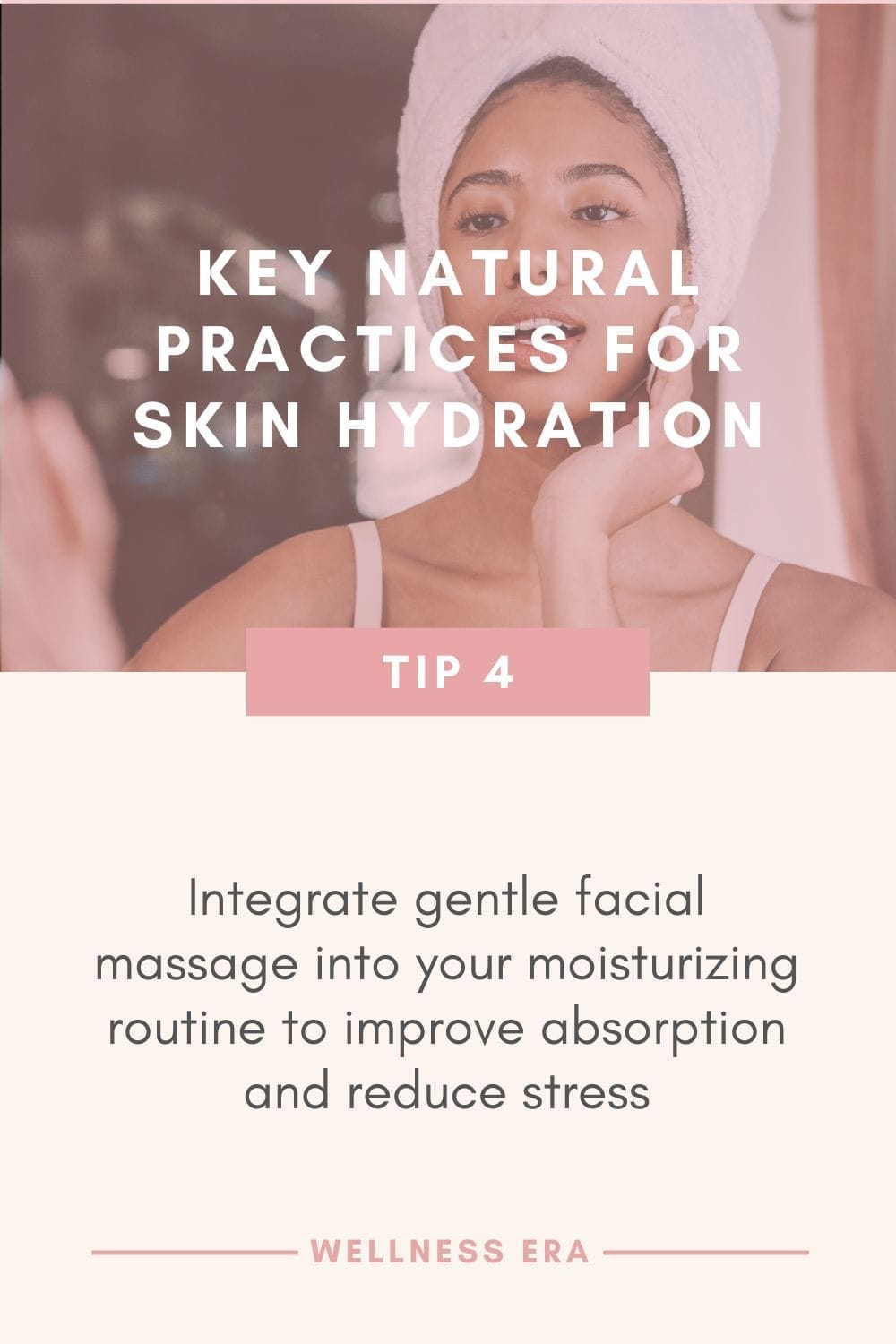
Conclusion
Moisturizing your skin naturally is not only effective but also a safe and sustainable way to maintain your skin’s health and hydration. Whether your skin is oily, dry, sensitive, or aging, natural moisturizers provide hydration without the risk of harmful chemicals or synthetic ingredients. By choosing products made with natural oils, humectants, and plant-based extracts, you can keep your skin hydrated, balanced, and protected from environmental stressors.
In addition to moisturizing, maintaining a healthy diet, staying hydrated, and following gentle skincare practices are all key elements of an effective skincare routine. Remember, it’s not just about the products you use, but how you use them and the care you put into your overall routine.
Taking these steps will help ensure that your skin remains supple, smooth, and glowing for years to come. If you're ready to take your skincare routine to the next level, start incorporating these natural practices today—your skin will thank you.
References
Baran, R. and Maibach, H.I., 2017. Textbook of Cosmetic Dermatology. CRC Press. https://www.taylorfrancis.com/books/edit/10.1201/9781315160504/textbook-cosmetic-dermatology-robert-baran-howard-maibach
Barel, A.O., Paye, M. and Maibach, H.I., 2009. Handbook of Cosmetic Science and Technology. 3rd ed. Informa Healthcare. https://www.taylorfrancis.com/books/edit/10.1201/b15273/handbook-cosmetic-science-technology-marc-paye-howard-maibach-andré-barel
Dini, I. and Laneri, S. (2021) ‘The new challenge of green cosmetics: Natural food ingredients for cosmetic formulations’, Molecules, 26(13), p. 3921. Available at: https://www.mdpi.com/1420-3049/26/13/3921
Proksch, E., Brandner, J.M. and Jensen, J.M., 2008. The skin: an indispensable barrier. Experimental Dermatology, 17(12), pp.1063-1072. Available at: https://pubmed.ncbi.nlm.nih.gov/19043850/
Frequent Asked Questions(FAQ)
How can I naturally hydrate my skin at night?
Apply a natural, hydrating oil or cream with ingredients like hyaluronic acid, jojoba oil, or shea butter to restore moisture overnight. Incorporating hydrating masks can also boost moisture levels while you sleep
Your nighttime routine is just as important as your morning one when it comes to hydration. Explore our guide on6 Steps to Hydrate and Combat Dryness of Skinfor expert tips on locking in moisture while you sleep.
What should I look for in a natural moisturizer?
Look for moisturizers that contain natural humectants like aloe vera, glycerin, or hyaluronic acid, as well as occlusive ingredients like shea butter or coconut oil to lock in moisture
Does natural moisturizing work for all skin types?
Yes, natural moisturizing works for all skin types, including oily, dry, sensitive, and aging skin. It’s important to choose the right type of natural moisturizer for your specific skin needs.
Check out our comprehensive guide on theBest Natural Moisturizers for Every Skin Typeto find the perfect match for your skin.
How can I moisturize sensitive skin without irritation?
Choose fragrance-free, hypoallergenic moisturizers that contain soothing ingredients like aloe vera, ceramides, and chamomile to calm and hydrate sensitive skin without irritation.
If you struggle with redness or irritation, it’s important to choose calming ingredients. Learn how to soothe your skin naturally in our post onReducing Inflammation Naturally for Smoother Skin.
What’s the difference between hydrating and moisturizing skin?
Hydrating means adding water to the skin, while moisturizing involves locking in that water to prevent it from escaping. Look for products with humectants to hydrate and occlusives to moisturize.
Here is something you might also like..
Would you like to receive something special?
Try out the best, inspirational weekly newsletter for your natural wellness era!
My Wellness Era Weekly
SUBSCRIBE TO OUR NEWSLETTER
Your Weekly Dose of Natural Wellness
Fill out the form below, and you will reveice "My Wellness Era Weekly" delivered to your inbox.
What you can expect: a short, warm, and personal note from our founder. Mindset shifts, journal prompts, or self-care reminders. Inspiring quotea related to wellness, mindfulness, or self-love. Small, actionable wellness habits you can try. Recomendations we love, are testing, or recently discovered. Highlights of our latest blog posts.
+++ What we’re loving every single week.
QUICK LINKS
SOCIAL
CATEGORIES



